Challenges in Moving Toward a More Inclusive Democracy: Findings from the 2022 American Values Survey
State of the Nation and Desire for Change
Approximately three-quarters of Americans agree that the country is heading in the wrong direction, but there is considerable division over whether the country needs to move backward — toward an idealized, homogeneous past — or forward, toward a more diverse future. Though most Americans favor moving forward, a sizable minority yearn for a country reminiscent of the 1950s, embrace the idea that God created America to be a new promised land for European Christians, view newcomers as a threat to American culture, and believe that society has become too soft and feminine. This minority is composed primarily of self-identified Republicans, white evangelical Protestants, and white Americans without a college degree. The majority of Americans, however, especially younger Americans, the religiously unaffiliated, and Democrats, are more likely to embrace a competing vision for the future of America that is more inclusive.
Direction of the Country
Nearly three in four Americans (74%) say things in this country are going in the wrong direction, compared with 24% who say the country is moving in the right direction. Large majorities of Republicans (93%) and independents (76%) say the country is moving in the wrong direction, compared with a narrower majority of Democrats (53%).
White evangelical Protestants are on par with Republicans — 93% say the country is going in the wrong direction. White Catholics (81%) and white mainline Protestants (76%) largely agree. Three in four other Christians (75%) say the same, as do 72% of religiously unaffiliated Americans, 65% of non-Christian religious Americans, 60% of Hispanic Catholics, and 59% of Black Protestants.[1]
By race and ethnicity, white Americans are most likely to say things are going in the wrong direction (80%), while 69% of those who identify as multiracial, AAPI, Native American, or any other race say the same, as do 66% of Hispanic Americans and 58% of Black Americans. White Americans with at least a four-year college degree are less likely than those without a four-year college degree to say things are going in the wrong direction (74% vs. 84%). There are no differences by gender or age.
Division over Whether Country Is Better or Worse Since 1950s
Americans are equally divided on the question of whether the country’s culture and way of life have become better (49%) or worse (49%) since the 1950s. Those who are most likely to say the country is moving in the wrong direction are also most likely to say things have gotten worse since the 1950s. Two-thirds of Republicans (66%) believe things have changed for the worse since the 1950s, compared with half of independents (50%) and only 30% of Democrats.
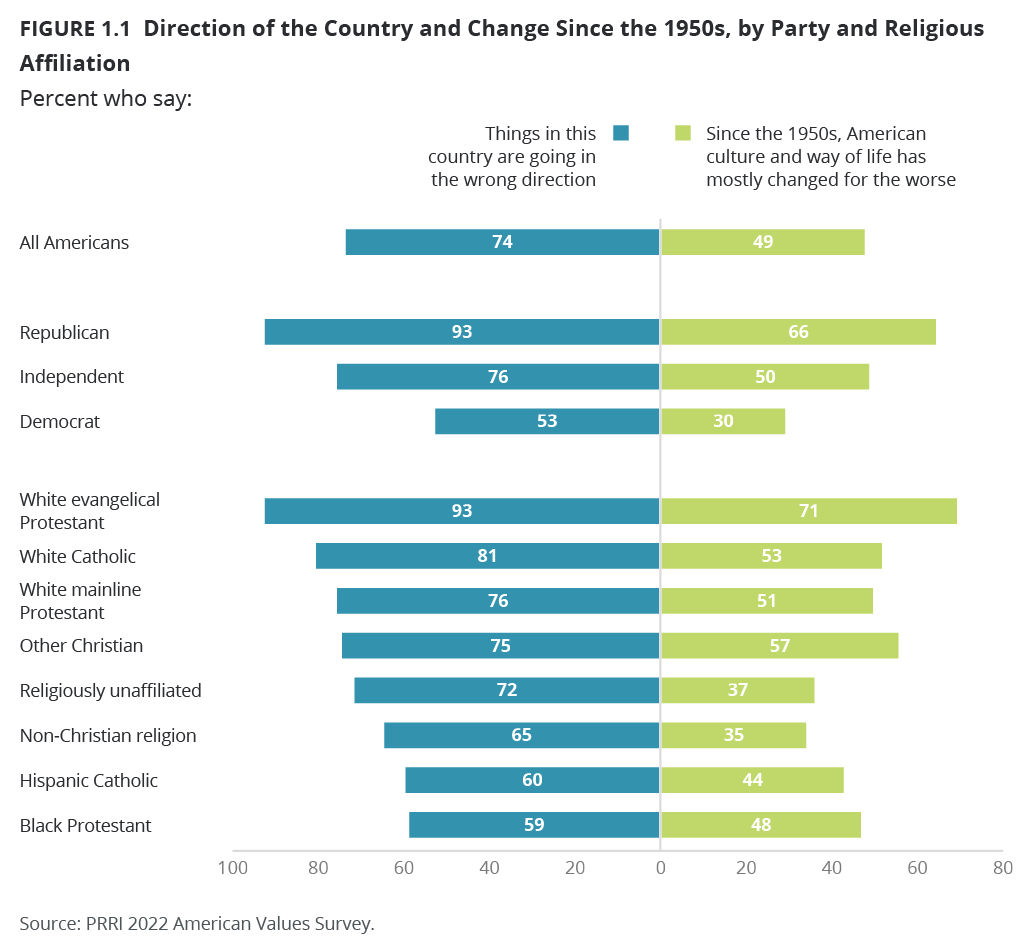
Similarly, 71% of white evangelical Protestants say the country has changed for the worse since the 1950s, as do 57% of other Christians and slim majorities of white Catholics (53%) and white mainline Protestants (51%). Less than half of Black Protestants (48%), Hispanic Catholics (44%), religiously unaffiliated Americans (37%) and non-Christian religious Americans (35%) say things have gotten worse since the 1950s.
White Americans are divided — 51% say the country has changed for the worse since the 1950s — but whites without a college degree are more likely than college graduates to agree (57% vs. 42%). Nearly half of Black Americans (48%) say things have changed for the worse since the 1950s, as do 44% of Hispanic Americans and 41% of multiracial Americans and those of another race.
There is not a gender divide on this question, but Americans age 65 and over are more likely than younger cohorts to say the country has changed for the worse since the 1950s (59%, compared to 54% among those ages 50–64, 45% among those ages 30–49, and 38% among those ages 18–29).
Answers to this question also correlate with media consumption. Those who most trust conservative media (77%) and Fox News (70%) among television news sources are much more likely than those whose most trusted news source is a non-television source (52%) or a mainstream television source (39%) to say the country has changed for the worse since the 1950s. Additionally, people who agree that things have gotten so far off track that true American patriots may have to resort to violence in order to save our country are more likely than those who disagree with that statement to say the country has changed for the worse (71% vs. 43%).
Did God Intend America to Be a Promised Land?
Three in ten Americans (31%) agree that “God intended America to be a new promised land where European Christians could create a society that could be an example to the rest of the world.” Just less than half of Republicans (49%) agree with this, compared with 26% of independents and only 18% of Democrats.
Half of white evangelical Protestants agree (50%), but other white Christians are less likely to do so: 37% of white mainline Protestants and 36% of white Catholics say God intended America to be a new promised land. Forty-four percent of other Christians and 32% of Hispanic Catholics agree with the statement, as do one in five Black Protestants (22%), non-Christian religious Americans (22%), and religiously unaffiliated Americans (16%).
About one-third of white Americans (32%) and multiracial or other-race Americans (33%) agree with this statement, as do 29% of Hispanic Americans and 23% of Black Americans.[2] White Americans without a four-year college degree are almost twice as likely as those with a four-year degree to agree (39% vs. 20%).
Those who most trust conservative media (66%) and Fox News (54%) among television news sources are much more likely than those who choose no television source (29%) or mainstream media sources (24%) to agree that God intended America to be a new promised land. Additionally, people who agree that things have gotten so far off track that true American patriots may have to resort to violence in order to save our country are more likely than those who disagree with that statement to say God intended America to be a new promised land (51% vs. 27%).
Newcomers as a Threat vs. Strength
Four in ten Americans (40%) say the growing number of newcomers from other countries threatens traditional American customs and values, compared with 55% who say it strengthens American society. Nearly seven in ten Republicans (69%) say newcomers are a threat, compared with a far lower percentage of independents (37%) and Democrats (17%). Eight in ten Democrats (81%) and 28% of Republicans say newcomers from other countries strengthen American society.
White Christian subgroups are significantly more likely than other Americans to perceive newcomers as a threat. Nearly two-thirds of white evangelical Protestants (65%) say newcomers are a threat, as do a slim majority of white mainline Protestants (53%) and half of white Catholics (50%). Four in ten other Christians (40%) say the same, along with less than one-third of Hispanic Catholics (31%), Black Protestants (29%), non-Christian religious Americans (27%), and religiously unaffiliated Americans (27%).
White Americans (46%) are more likely than multiracial and other-race Americans (31%), Hispanic Americans (31%), and Black Americans (28%) to say newcomers are a threat. The education divide among white Americans is wide: those with a four-year college degree or more (34%) are much less likely than those without a four-year degree (53%) to say newcomers are a threat.
Men are slightly more likely than women to say newcomers are a threat (42% vs. 38%). Older Americans are also much more likely to say this (52% among those 65 and older, compared with 47% among those 50–64, 34% of those ages 30–49, and 28% of those ages 18–29).
Three in four Americans who most trust conservative television news (76%) and Fox News (74%) say newcomers are a threat, whereas 42% of those who do not trust a particular television news source and 28% of those who trust mainstream sources say the same. Those who think true American patriots might have to resort to violence to set the country right are much more likely than those who do not to say newcomers are a threat (68% vs. 33%).
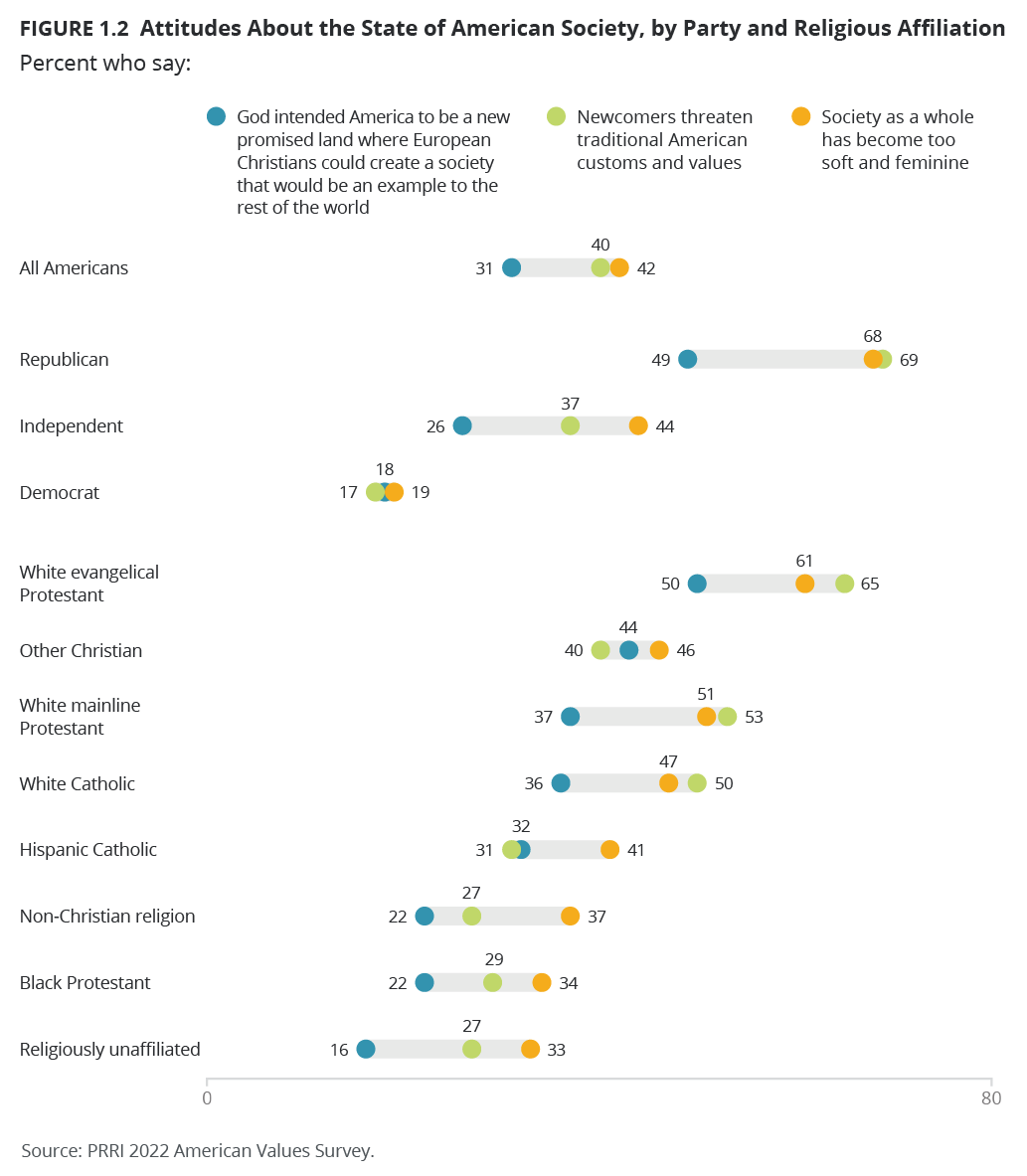
Society is Too Soft and Feminine
About four in ten Americans (42%) agree that society as a whole has become too soft and feminine, and a majority (53%) disagree. The partisan divide on this question is nearly 50 percentage points: Approximately two-thirds of Republicans (68%) say society has become too soft and feminine, compared with 44% of independents and less than one in five Democrats (19%).
Six in ten white evangelical Protestants (61%) agree that society has become too soft and feminine, as do a slim majority of white mainline Protestants (51%), 47% of white Catholics, and 46% of other Christians. About four in ten Hispanic Catholics (41%) agree, as do 37% of non-Christian religious Americans, 34% of Black Protestants, and 33% of religiously unaffiliated Americans.
White Americans (45%), Hispanic Americans (43%), and multiracial and other-race Americans (41%) are more likely than Black Americans (32%) to say society has become too soft and feminine. White Americans without a four-year college degree (50%) are more likely than those with a four-year degree or higher (36%) to agree.
Men are more likely than women to agree with the statement (48% vs. 37%), but there are not substantial differences by age.
Structural Reforms to Parties and Process
Support for Third Parties
When asked to choose from four options regarding the two-party system in U.S. elections and hypothetical third parties, a plurality of Americans (42%) say they would vote for a candidate from a new party that is in between Democrats and Republicans politically. An equal proportion of Americans say they would vote for a candidate from a new political party that is more liberal than the Democrats (11%) or more conservative than the Republicans (11%). Three in ten (31%) say they would not vote for a candidate from a new political party.
Republicans are divided between not voting for a candidate from a new party (35%) and voting for a candidate from a party in between Democrats and Republicans (34%), with an additional 25% saying they would vote for a candidate from a party more conservative than the Republicans.
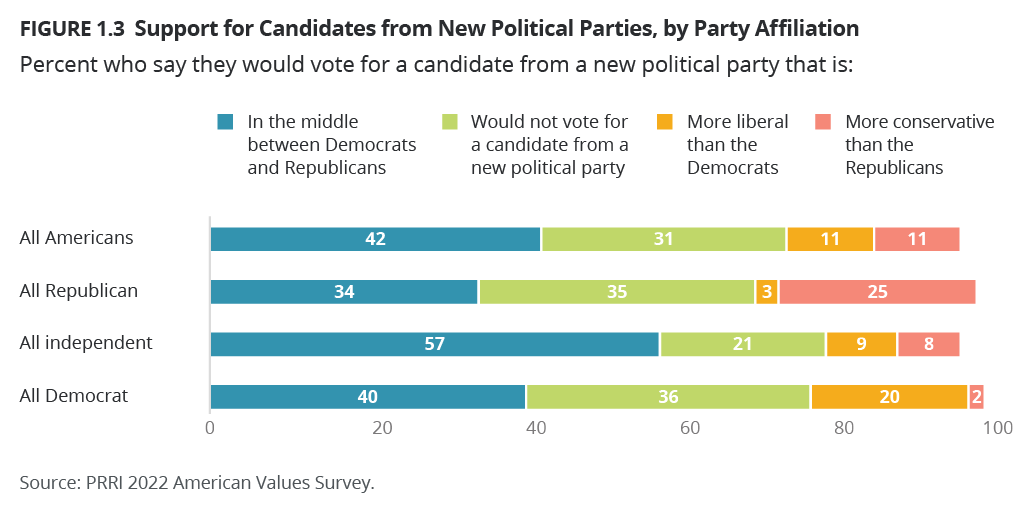
A plurality of Democrats (40%) say they would vote for a candidate from a party between the Republican and Democratic parties, 36% say they would not vote for a candidate from a new party, and 20% say they would vote for a candidate from a party more liberal than the Democrats.
Not surprisingly, a majority of independents (57%) say they would vote for a candidate from a party in between the two major parties, while 21% say they would not vote for a candidate from a new party, and less than one in ten say they would vote for a candidate from a party more liberal than Democrats (9%) or more conservative than Republicans (8%).
The plurality of Americans (42%) who would vote for a candidate from a new party that is in between Republicans and Democrats comprises a diverse cohort of Americans. A plurality are independents (44%), 25% are Democrats, and 22% are Republicans. However, few are strong partisans. Only 9% are strong Democrats and 8% are strong Republicans. Ideologically, 51% are moderate, 27% are conservative, and 21% are liberal.
This group closely resembles the general American population religiously, regionally, by racial and ethnic makeup, by age, and by gender. It is a more educated group than the general population, though: 41% have a four-year college degree or higher, compared with 35% among all Americans.
Support for Voting Reforms
Americans are divided on what the bigger problem is today: 49% say eligible voters being denied the right to vote is a bigger problem than people casting votes who are not eligible, while 46% say the latter is the bigger problem.
Partisans are on opposite sides of this question, with 85% of Republicans saying ineligible people casting votes is the bigger problem and 83% of Democrats saying eligible voters being denied the right to vote is the bigger problem. A majority of independents (54%) say eligible voters being denied the right to vote is the bigger problem, while 42% side with Republicans.
Most Black (76%) and Hispanic (60%) Americans say the bigger problem is eligible voters being denied the right to vote, as do a slim majority (51%) of multiracial and other-race Americans. White Americans stand alone on this question, with a majority (54%) saying that the bigger problem is people who are not eligible casting votes. White Americans without a four-year college degree (56%) are more likely than those with a four-year college degree or higher (49%) to say this.
Most Americans (64%) think Congress should pass a voting rights law to guarantee every citizen access to the ballot, while 31% say voting rights decisions should be left to the states. Large majorities of Democrats (89%) and independents (68%) support Congress passing a voting rights law, while only 42% of Republicans agree. A majority of Republicans (55%) support leaving it to the states.
Black (74%) and Hispanic (70%) Americans overwhelmingly support Congress passing a voting rights law, as do six in ten white Americans (59%). Support is lower among white Americans without a four-year college degree (56%) than among those with at least a four-year college degree (63%).
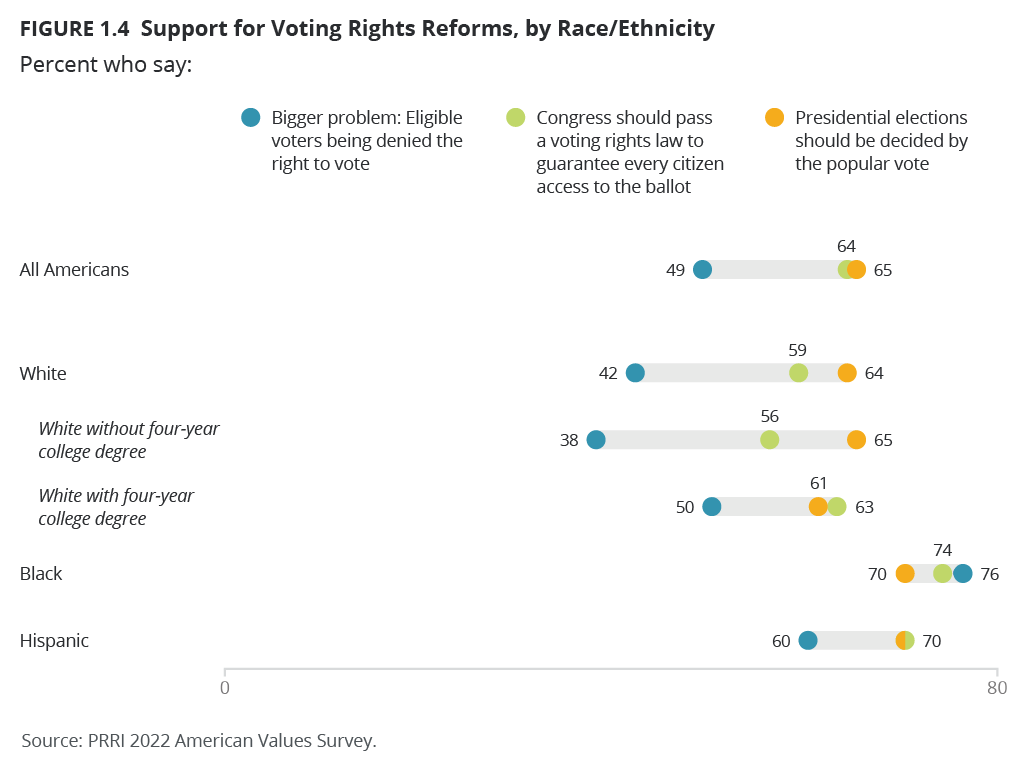
Additionally, nearly two-thirds of Americans (65%) say that presidential elections should be decided by a popular vote, while 30% say the decision should remain with the Electoral College. Most Democrats (84%) and independents (67%) prefer the popular vote, but Republicans are divided, with 48% favoring the popular vote and 50% favoring the Electoral College.
The same patterns hold by race: Black (70%) and Hispanic (70%) Americans broadly favor deciding presidential elections by a popular vote, as do a majority of white (64%) and multiracial and other-race Americans (62%). There is only a small divide among white Americans by education, with 65% of those without college degrees and 61% with college degrees or higher favoring the popular vote.
Women are more likely than men to favor the popular vote (69% vs. 61%). Americans ages 18–29 (68%) and ages 39–49 (68%) are the most supportive of using the popular vote to decide presidential elections, compared with 64% of those ages 50–64 and 61% of those ages 65 and older.
Reforms to the Supreme Court
The Unpopular Decision to Overturn Roe v. Wade
In June 2022, the Supreme Court issued its ruling in Dobbs v. Jackson Women’s Health Organization, which overturned Roe v. Wade, the 1973 decision that had affirmed a constitutional right to abortion. Six in ten Americans (61%) oppose overturning Roe, while 35% favor it. Most Democrats (82%) oppose it, including 71% who strongly oppose it. Additionally, 63% of independents oppose the move. A minority of Republicans (40%) oppose the decision, and a majority (58%) favor it.
Majorities of all religious groups except white evangelical Protestants (37%) and other Christians (44%) oppose the decision to overturn Roe, including 78% of religiously unaffiliated Americans, 73% of Black Protestants, 73% of non-Christian religious Americans, 67% of white mainline Protestants, 56% of white Catholics, and 52% of Hispanic Catholics.
Majorities of every race and ethnic group oppose the overturn of Roe, including 68% of Black Americans, 61% of white Americans, 57% of multiracial and other-race Americans, and 56% of Hispanic Americans. A majority of white Americans without a four-year college degree (57%) oppose the decision, although opposition is higher among those with a four-year college degree or higher (67%).
Women (62%) are slightly more likely than men (58%) to oppose the overturn of Roe.
Two-thirds of young Americans ages 18–29 (68%) oppose the overturn of Roe, including nearly half (49%) who strongly oppose the decision. Majorities of all other age groups oppose the decision as well, including 62% of those ages 30–49, 57% of those ages 50–64, and 54% of those ages 65 and over.
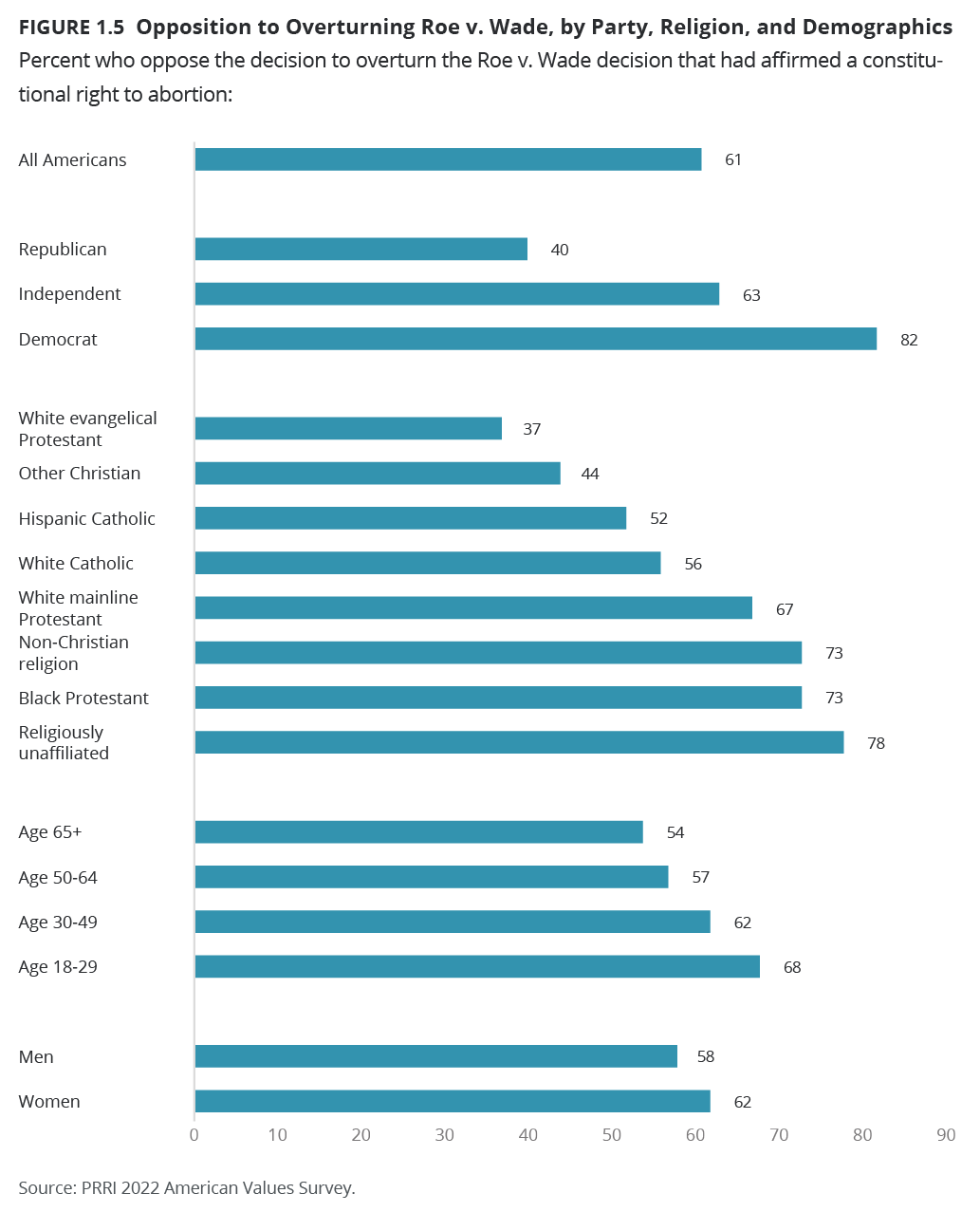
Mandatory Retirement and Term Limits for SCOTUS Justices
Three in four Americans (76%) say there should be a mandatory retirement age for U.S. Supreme Court justices. This is a rare issue on which support is bipartisan: 87% of Democrats, 77% of independents, and 69% of Republicans agree that there should be a mandatory retirement age.
There are few differences by religion or demographic on this question, but those who oppose overturning Roe are substantially more likely to favor mandatory retirement ages than those who favor overturning Roe (83% vs. 68%).
Most Americans (75%) also agree that there should be term limits for Supreme Court justices, including 86% of Democrats, 77% of independents, and 68% of Republicans.
There are few differences by religion or demographic on this question either, but, again, those who oppose overturning Roe are substantially more likely to favor term limits than those who favor overturning Roe (88% vs. 60%).
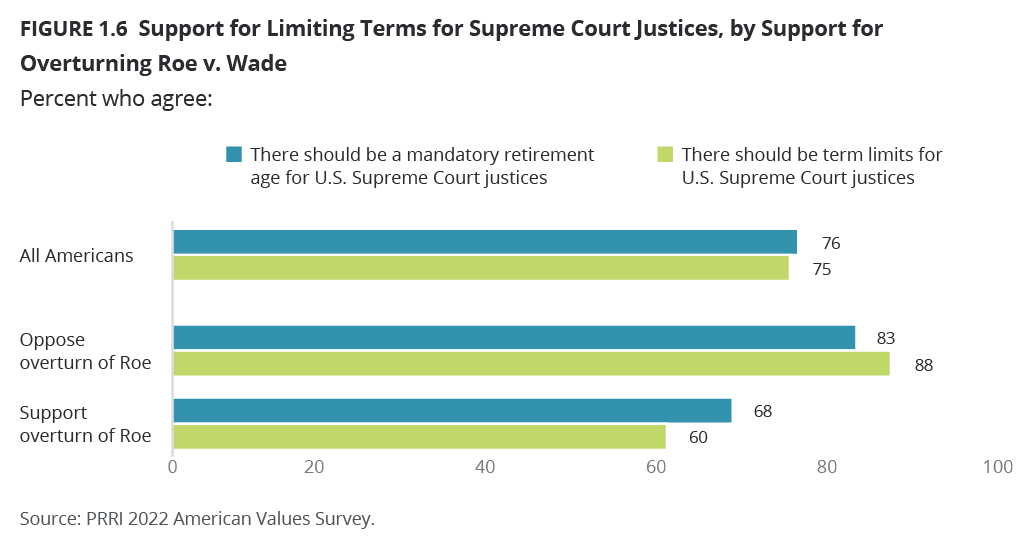
Midterm Elections and Voting
Voting in November
At the time of this survey, in early September, 37% of all adults said they plan to vote for the Democratic congressional candidate in their district, 34% said they plan to vote for the Republican candidate, 25% were unsure, and 3% said they did not plan to vote. Among registered voters, 37% support the Democrat, 36% support the Republican, and 23% were unsure.
A plurality of Americans (38%) do not know whether their congressional district is competitive; 22% say it is likely to be easily won by the Democrat, 21% say it is likely to be easily won by the Republican, and 19% say their district is competitive. Registered voters are only slightly more certain — 35% are unsure, 23% say the Democrat is likely to win, 22% say the Republican is likely to win, and 20% say their district is competitive.
Most Americans (55%) report being at least a little excited about voting in November, including 28% who are very excited, 16% who are somewhat excited, and 11% who are a little excited. About one in four are not at all excited about voting (24%), 14% say they do not plan to vote, and an additional 7% say they are not eligible to vote.
More than two-thirds of Republicans (69%) are at least a little excited about voting, including 41% who are very excited. Democrats are not far behind, with 64% at least a little excited, but fewer are very excited (33%). Independents are the least likely to say they are excited about voting (48%), including less than one in four who are very excited (23%).
Among those who say they plan to vote for the Republican in their congressional district, 51% report being very excited to vote, compared with 42% among those who plan to vote for the Democrat. A majority of those who are unsure how they plan to vote (53%) say they are not at all excited to vote.
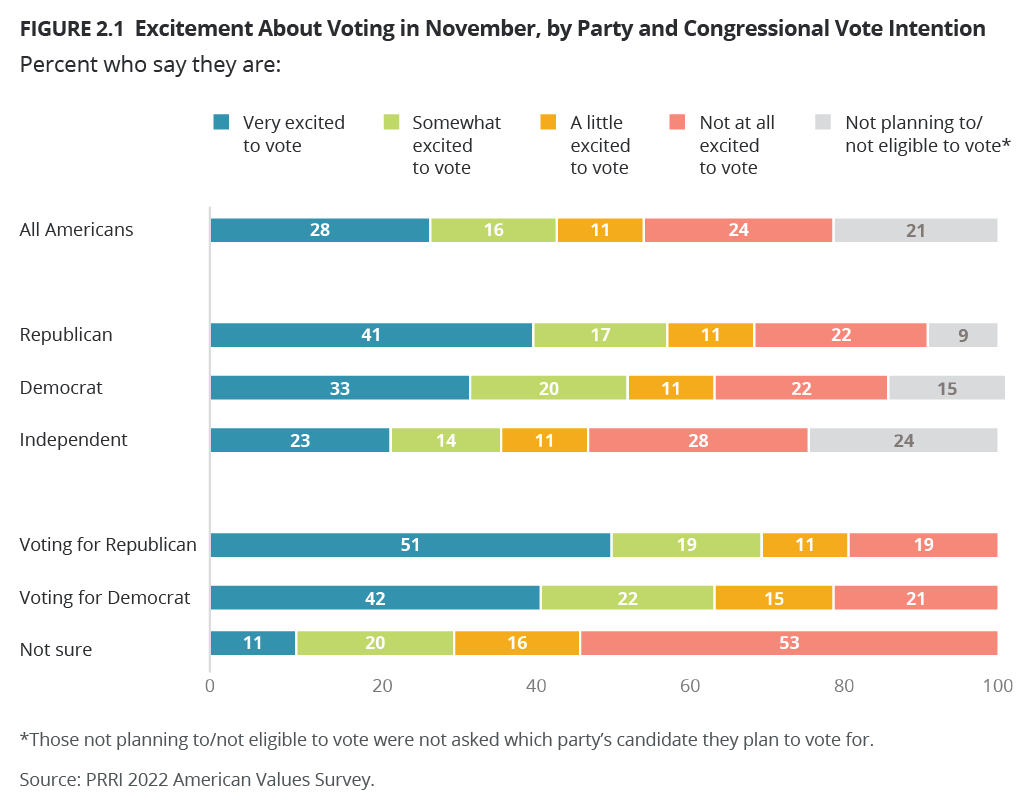
Roe Overturn and Motivation to Vote
When respondents are specifically asked to think about their motivation to vote in the wake of the Supreme Court overturning Roe v. Wade, 67% say they are motivated to vote, including 45% who are very motivated, 13% who are somewhat motivated, and 9% who are a little motivated. On this question, Democrats are most likely to say they are very motivated by the Supreme Court decision (63%), while less than half of Republicans (47%) and independents (40%) say the same. Majorities of strong Democrats (78%) and strong Republicans (56%) say they are very motivated to vote when thinking about the overturn of Roe v. Wade.
Women are more likely than men to say they are very motivated by the issue (49% vs. 41%). Democratic women (66%) are seven percentage points more likely than Democratic men (59%) to say this, while independent women and men are nine percentage points apart (45% vs. 36%). Republicans have the smallest gender gap, with 50% of women and 44% of men saying they are very motivated to vote following the overturn of Roe. Among all women, those ages 18–29 are more likely than their male counterparts to say they are very motivated to vote (46% vs. 32%).
About half of the people in most religious groups say they are very motivated to vote when thinking about the overturn of Roe v. Wade, including among white evangelical Protestants (50%), Black Protestants (50%), white Catholics (50%), religiously unaffiliated Americans (48%), non-Christian religious Americans (47%), and white mainline Protestants (45%). Other Christians (36%) and Hispanic Catholics (32%) are less likely to say they are very motivated by this issue.
Most Americans who are very excited to vote are also very motivated by the Roe overturn (79%). A majority of those who are somewhat excited to vote (57%) say they are very motivated by the Roe overturn, as do 48% of those who are a little excited to vote, and even 33% of those who say they are not at all excited to vote.
Those who oppose the Supreme Court decision to overturn Roe are more likely than those who favor that decision to say the decision makes them very motivated to vote in November (52% vs. 38%).
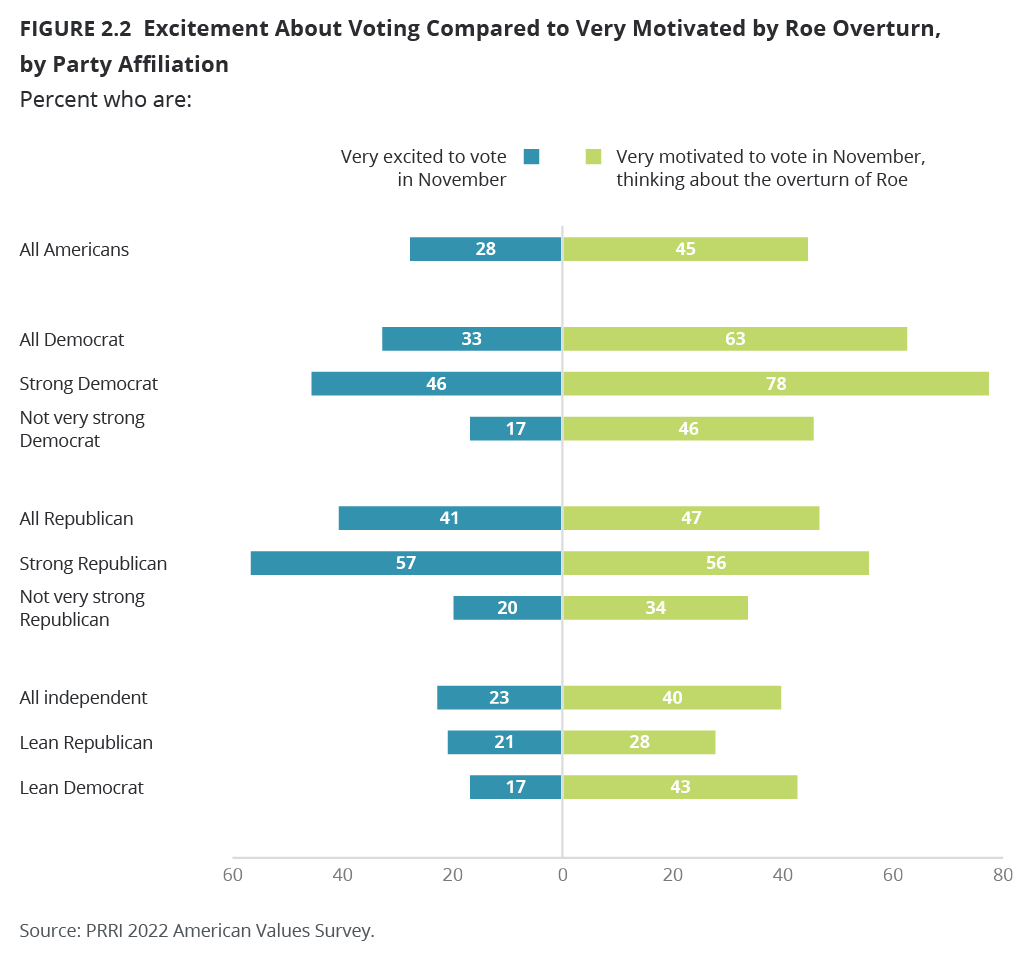
Critical Issues for Midterm Vote
The survey asked those who indicated that they plan to vote (i.e., those did not say they are ineligible to vote or that they do not plan to vote) whether each of 16 issues is a critical issue for their vote, one among many important issues, or not that important an issue. The issues most commonly rated as critical among all Americans who plan to vote, and the top issues for nearly every subgroup, are the health of our democracy (57%) and increasing costs of housing and everyday expenses (57%). At least four in ten say crime (47%), access to guns and gun safety (45%), abortion (45%), education (41%), and immigration (40%) are critical to their vote. At least one-third say health care (39%), the appointment of Supreme Court justices (36%), climate change (36%), the growing gap between the rich and the poor (34%), and jobs and unemployment (33%) are critical. Three in ten say terrorism is critical to their vote in November (30%), 26% say racial inequality is critical, 25% say infrastructure issues, such as bridges and the electrical grid, are critical, and only 19% say the coronavirus pandemic is critical.
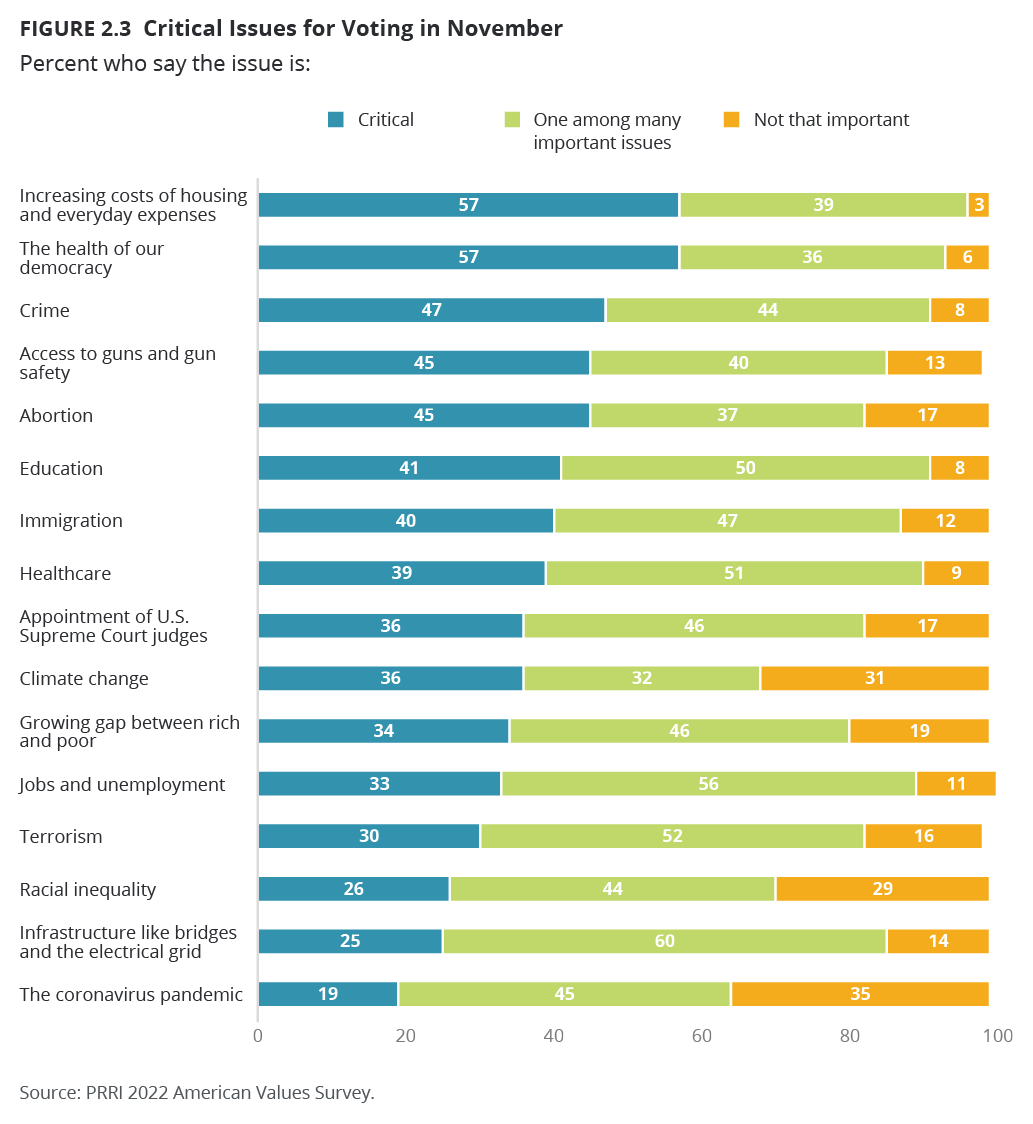
Top issues differ considerably by party. Republicans are most likely to say that increasing costs of housing and everyday expenses are critical to their vote (65%), followed by immigration (63%) and crime (62%). A majority (55%) also say the health of our democracy is critical. The top critical issues among Democrats are the health of our democracy (66%), abortion (65%), and access to guns and gun safety (63%). Majorities of Democrats also say climate change (61%) and increasing costs (52%) are critical to their vote. Independents are most likely to say the health of our democracy (55%), increasing costs (55%), and crime (47%) are critical to their vote.
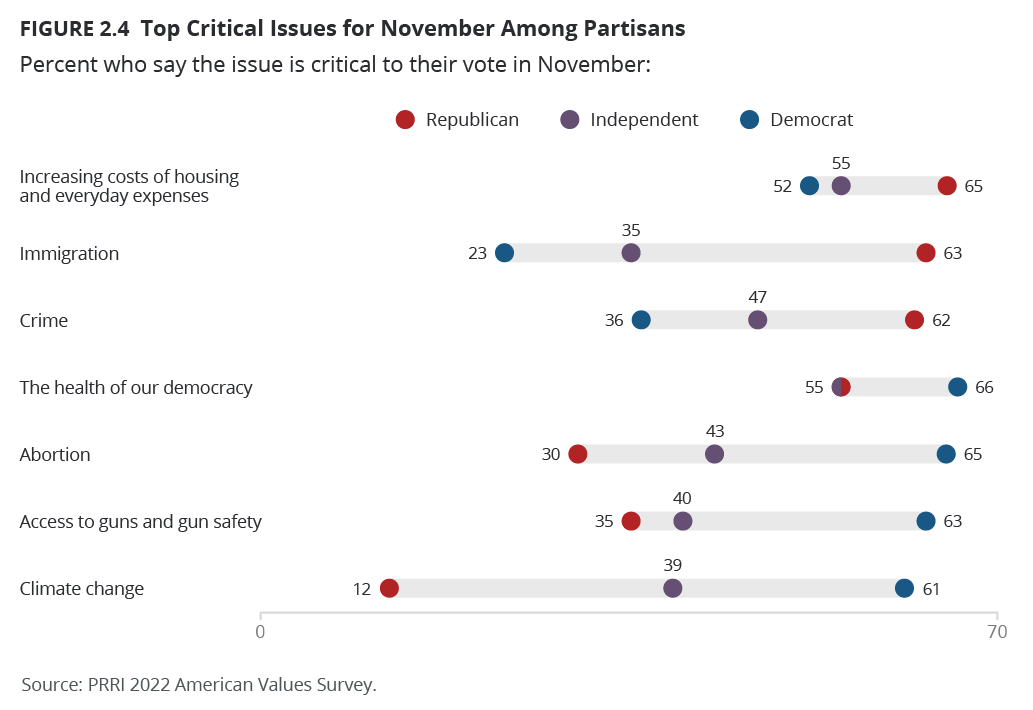
White evangelical Protestants closely resemble Republicans, in that their top three critical issues for voting are increasing costs of housing and everyday expenses (65%), immigration (59%), and the health of our democracy (59%). White mainline Protestants’ top issues are the health of our democracy (57%), increasing costs (51%), and immigration (49%). White Catholics are most likely to say the health of our democracy (64%), increasing costs (54%), and crime (54%) are critical to their vote in November.
Black Protestants prioritize increasing costs (65%), racial inequality (64%), and crime (60%), with majorities also saying the health of our democracy (59%), health care (57%), and abortion (56%) are critical to their vote. Hispanic Catholics are most likely to say increasing costs (59%), crime (48%), and climate change (44%) are critical to their vote.
Religiously unaffiliated Americans are most likely to say the health of our democracy (57%), abortion (56%), and increasing costs (56%) are critical issues for their vote, and 53% also rated climate change as critical. Non-Christian religious Americans are most likely to say the health of our democracy (67%), abortion (63%), and climate change (62%) are critical to their vote, with majorities also saying increasing costs (56%) and crime (51%) are critical.
White Americans are most likely to say the health of our democracy (61%), increasing costs of housing and everyday expenses (55%), and crime (45%) are critical to their vote. Hispanic Americans also prioritize increasing costs (63%) and crime (49%), but their third most critical issue is access to guns and gun safety (48%). Majorities of Black Americans say increasing costs (64%), racial inequality (62%), crime (57%), abortion (57%), access to guns and gun safety (57%), health care (55%), the health of our democracy (55%), and education (55%) are critical to their vote.
Majorities of all age groups say the increasing costs of housing and everyday expenses are a critical issue to their vote in November, while concern about the health of our democracy increases with age, from 40% critical among those ages 18–29 to 49% among those ages 30–49, 64% among those ages 50–64, and 71% among those ages 65 and over. Abortion is a top-three issue for those ages 18–29 (49%) and 30-49 (45%), while crime is a top-three issue for those ages 50–64 (53%) and 65 and over (61%). Additionally, access to guns and gun safety is a top-three critical issue for those ages 18–29 (45%).
Men and women are both likely to say the health of our democracy (56% and 58%, respectively) and increasing costs of housing and everyday expenses (54% and 60%) are critical to their vote, but the third most critical issue for women is abortion (52%), while for men it is crime (46%).
The health of our democracy showed up as a high priority across party, religious, and demographic lines, there are stark divides over what this means. For example, among Republicans who say the health of our democracy is a critical issue, 86% say the bigger voting problem today is ineligible voters casting votes. By contrast, 89% of Democrats who say the health of our democracy is a critical issue say legitimate voters being denied the right to vote is the bigger problem.
Partisans also have different attitudes toward political violence as a solution to the country’s problems. For example, among Republicans who say the health of our democracy is a critical issue, 33% say true American patriots may have to resort to violence if that’s what it takes to set things right. By contrast, among Democrats who say the health of our democracy is a critical issue, only 7% say true patriots may have to resort to violence.
Issues
Economic Concerns
Household Economic Situations
More than one-third of Americans (36%) say they are somewhat or very concerned about their ability to pay for basic goods for daily life over the next year. Similarly, more than one-third are concerned about paying utility bills (36%) and medical bills (35%) over the next year. Around three in ten Americans (32%) say they are concerned about paying their rent or mortgage, 27% are concerned about paying credit card bills, and 18% are concerned about being able to make student loan payments over the next year. Combined, a majority of Americans (54%) report being concerned about their ability to pay for at least one of these six items over the next year.
There are minimal partisan differences in concern about making rent or mortgage payments in the next year. Almost a third of Republicans (31%) and Democrats (32%) are concerned about being able to pay for three or more of the six items, and independents are slightly more likely to be concerned about three or more items (38%).
Fewer white Americans (32%) and multiracial or other-race Americans (32%) than Hispanic Americans (44%) and Black Americans (41%) are concerned about paying for three or more of the six items.
Americans with a no college experience (47%) are the most concerned about paying for three or more out of the six items, compared with 35% of Americans with some college education, 25% of Americans with a college degree, and only 16% of Americans with a postgraduate degree.
More than four in ten Americans ages 18–29 (44%) are concerned about affording three or more expenses, compared with 35% of those ages 30–49, 33% of those ages 50–64, and 27% of those over age 65. Additionally, women (39%) are more concerned than men (31%) about being able to afford three or more of the six items.
Generational Economic Mobility
Just about half of Americans (49%) agree that their generation is better off than their parents’ generation was, while one-third of Americans (33%) agree that the next generation will be better off than their parents’ generation. Majorities of Republicans (56%) and Democrats (55%) believe that their generation is better off than their parents’ generation was, compared with 45% of independents. However, Republicans (27%) are notably less likely than independents (34%) and Democrats (42%) to say that the next generation will be better off financially than their parents’ generation.
Black Americans (56%) are more likely than Hispanic Americans (48%) and white Americans (47%) to believe that their generation is better off than that of their parents, while Americans of other races (52%) are about as likely as Americans overall to agree. White Americans (27%) are less likely than Hispanic Americans (44%), Black Americans (44%), and Americans of other races (42%) to agree that the next generation will be better off than their parents’ generation.
The starkest differences in opinion about generational mobility fall along age lines. Americans over age 65 are more than twice as likely as those ages 18–29 to say that their generation is better off than their parents’ generation (73% vs. 29%), with Americans ages 30–49 (42%) and 50–64 (53%) falling in between. However, 29% of those ages 18–29, 32% of those ages 30–49, and 32% of those ages 50–64 say the next generation will be better off than their parents’ generation, compared with 40% of those over age 65.
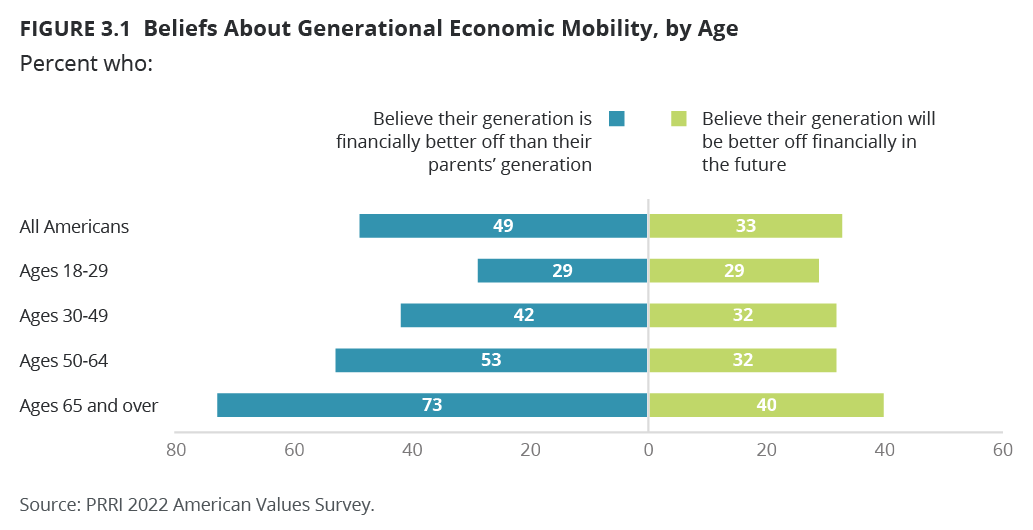
The Role of College in Economic Mobility
Just about four in ten Americans (42%) say that a college education is a smart investment, compared with a majority (55%) who say it is more of a risky gamble that may not pay off. This marks a 13-point decline from 2016, when a majority (55%) saw college education as a smart investment. Confidence in the value of a college education has declined among all partisan groups. Republicans are now far less likely to say college is a smart investment, down 18 percentage points (from 52% in 2016 to 34% in 2022), while the decline is eight percentage points among independents (from 49% to 41%) and seven percentage points among Democrats (from 66% to 59%).
A majority of multiracial or other-race Americans (56%) and half of Hispanic Americans (50%) say that a college education is a good investment, compared with less than half of Black Americans (46%) and four in ten white Americans (38%). These shares have declined across the board since 2016 (down from 52% among white Americans, 56% among Black Americans, and 68% among Hispanic Americans).
White Americans with a four-year college degree or higher are about twice as likely as white Americans without a four-year college degree to say that college is a smart investment (56% vs. 27%). While confidence in the value of a college degree has fallen seven percentage points (from 63%) among white college graduates, it has plummeted 19 percentage points among whites without a college degree (from 46%) since 2016.
Unsurprisingly, Americans with a postgraduate degree (69%) or a four-year college degree (51%) are more likely than those with some college experience but no degree (33%) or a high school degree or less (34%) to say college is a good investment. In 2016, half of Americans with some college experience (50%) or a high school degree or less (51%) felt that college was a good investment.
Abortion
More than six in ten Americans (62%) say abortion should be legal in most or all cases, compared with less than four in ten (37%) who say it should be illegal in most or all cases. Notably, only 8% of Americans say it should be illegal in all cases, compared with 27% who say it should be legal in all cases. Since PRRI began asking this question, in 2010, the proportion of Americans who say abortion should be illegal in most or all cases has never been above 45%, and the proportion who say it should be illegal in all cases has never been above a peak of 19%, in 2014.
Just over one-third of Republicans (37%) say abortion should be legal in most or all cases, and 62% believe it should be illegal in most or all cases, although only 11% say it should be illegal in all cases. Two-thirds of independents (67%) and an overwhelming majority of Democrats (86%) say abortion should be legal in most or all cases. Since 2010, Democratic support for the legality of abortion in all or most cases has grown, with more than 8 in 10 Democrats routinely expressing support since 2021.
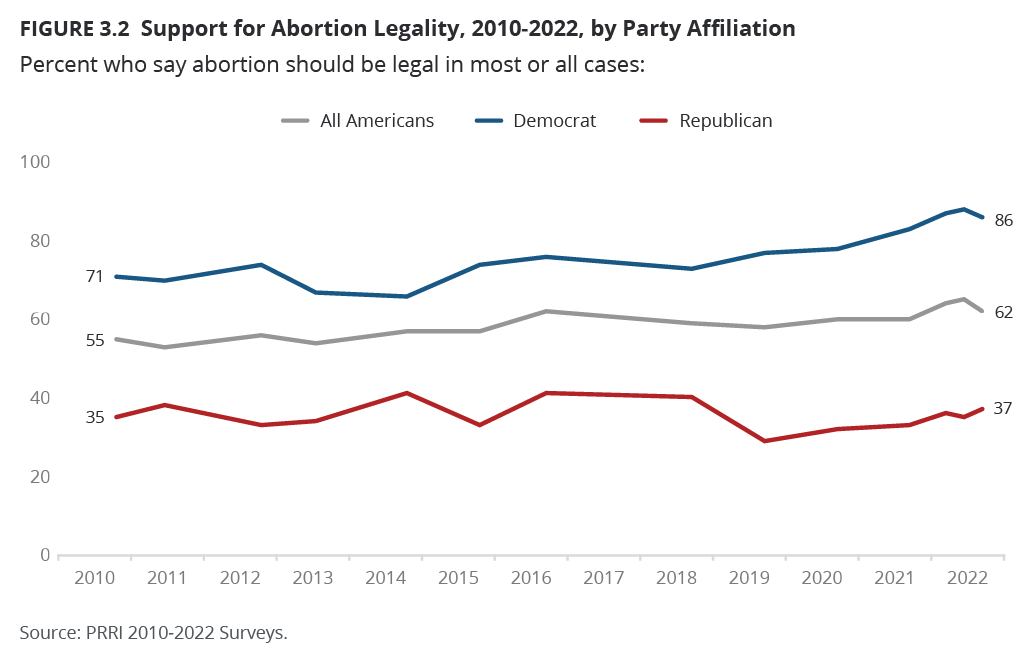
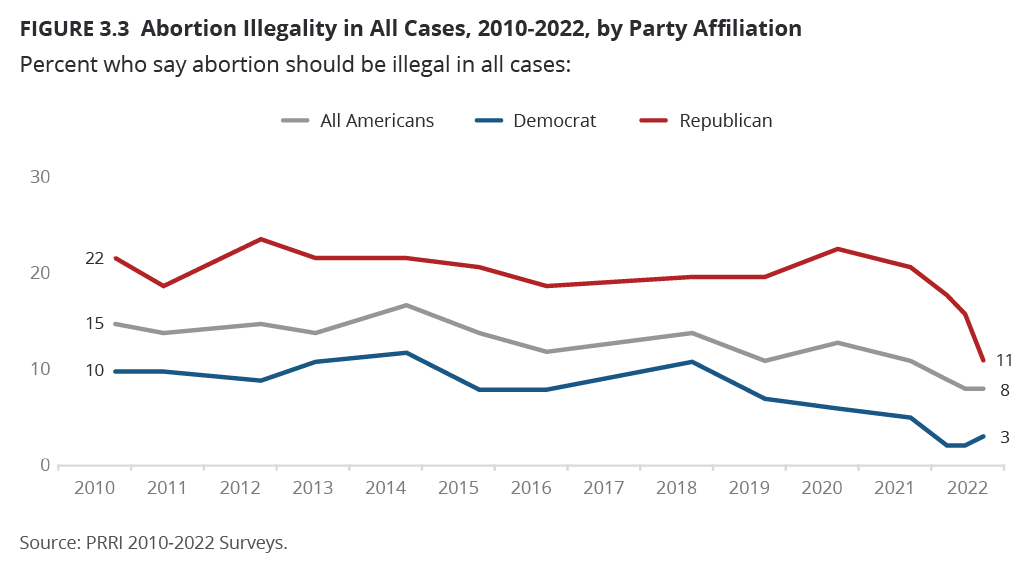
Abortion as a Litmus Test for Supporting a Candidate
Nearly one in four Americans (24%) say they will only vote for a candidate who shares their views on abortion, compared with a slim majority who say a candidate’s position on abortion is just one of many important factors (53%) and 19% who do not see abortion as a major issue when voting. The proportion of Americans who say a candidate must share their views on abortion has increased from 18% in 2012 and from 20% as recently as 2020. The proportion who do not see abortion as a major issue is at a low mark, down from 33% in 2012 and 26% in 2020.
Among Americans who say that abortion should be legal in most or all cases, 27% say they will only vote for candidates who share their views on abortion. Among those who say abortion should be illegal in most or all cases, 22% say they will only vote for candidates who share that view. Notably, Democrats (35%) are more likely than Republicans (21%) and independents (21%) to say that they will only vote for candidates who share their views on abortion. This finding is a striking reversal from 2020, when Republicans (32%) were more likely than Democrats (17%) to say they would only vote for a candidate who shares their views on abortion.
White Americans (27%) are significantly more likely than Americans who identify as multiracial or with another race (19%) and Black Americans (18%) to say that they will only vote for candidates who share their views on abortion, but they do not differ significantly from Hispanic Americans (22%). About three in ten white Americans with a college degree (29%) and one in four without a college degree (25%) say that they will only vote for candidates who share their views on abortion.
Americans in the 18-29 age range are notably more likely than other age groups to say they will only vote for candidates who share their views on abortion (31%, compared with 23% among those 30-49, 22% among those 50-64, and 23% among those 65 and over). Women are significantly more likely than men to say that they will only vote for candidates who share their views on abortion (27% vs. 21%). Women ages 30–49 are notably more likely than men ages 30–49 to say that they will only vote for candidates who share their views on abortion (29% vs. 17%), but there are no statistically significant differences by gender within other age groups, including women ages 18-29 (35%) vs. men ages 18-29 (27%), women ages 50–64 (23%) vs. men ages 50–64 (20%), and senior women (24%) vs. senior men (22%).
Restricting Birth Control
The vast majority of Americans (79%) oppose laws that would restrict what types of birth control can be used to prevent pregnancy. Just 16% of Americans favor these laws. Republicans (20%) are nearly twice as likely as Democrats (11%) to be somewhat or strongly in favor of these laws.
Across religious groups, there is scant support for laws restricting access to birth control. Hispanic Catholics (30%) are the most likely to favor these laws, along with 25% of white evangelical Protestants and 24% of members of non-Christian religions. One in five (20%) other Christians and Black Protestants (18%) also favor these laws, compared with one in ten religiously unaffiliated (10%), white Catholics (10%), and white mainline Protestants (10%).
Crossing State Lines for Abortions
Three in four Americans (75%) oppose laws that would make it illegal to cross state lines to obtain an abortion, including 55% who strongly oppose, while 20% favor such laws. Republicans (30%) are about twice as likely as independents (16%) and Democrats (13%) to favor these laws.
About one-third of white evangelical Protestants (35%) and other Christians (34%) as well as 29% of Hispanic Catholics, 24% of Black Protestants, 21% of members of non-Christian religions, 19% of white mainline Protestants, and 14% of white Catholics favor laws that would make it illegal to cross state lines to obtain an abortion in a state where it is legal. Just 9% of religiously unaffiliated Americans favor these laws.
Mailing Abortion Pills
About two-thirds of Americans (68%) oppose laws that would make it illegal to use or receive through the mail Food and Drug Administration-approved drugs for a medical abortion, also known as abortion pills, compared with 27% who favor them. Forty percent of Republicans, 26% of independents, and 15% of Democrats favor laws that would make it illegal to use abortion pills or receive them through the mail.
White evangelical Protestants (47%) are the most likely to favor laws that prevent abortion pills being sent by mail. Four in ten Hispanic Catholics (40%) and other Christians (41%) also favor these laws. Members of non-Christian religions (30%), Black Protestants (27%), white Catholics (25%), and white mainline Protestants (23%) are less likely to favor these laws. Just 12% of the religiously unaffiliated do.
Ensuring Some Abortions Are Available
Nearly seven in ten Americans (68%) somewhat or strongly favor ensuring that at least some health care professionals in their community provide legal abortions, compared with 27% who oppose it. Large majorities of Democrats (85%) and independents (74%), as well as half of Republicans (50%), favor ensuring that some health care professionals can provide abortions.
With the sole exception of white evangelical Protestants (41%), all major religious groups favor ensuring that at least some health care professionals in their community provide legal abortions. Members of non-Christian religions (84%) and religiously unaffiliated Americans (83%) are most likely to favor this, followed by white mainline Protestants (74%), Hispanic Catholics (73%), white Catholics (68%), Black Protestants (68%), and other Christians (55%).
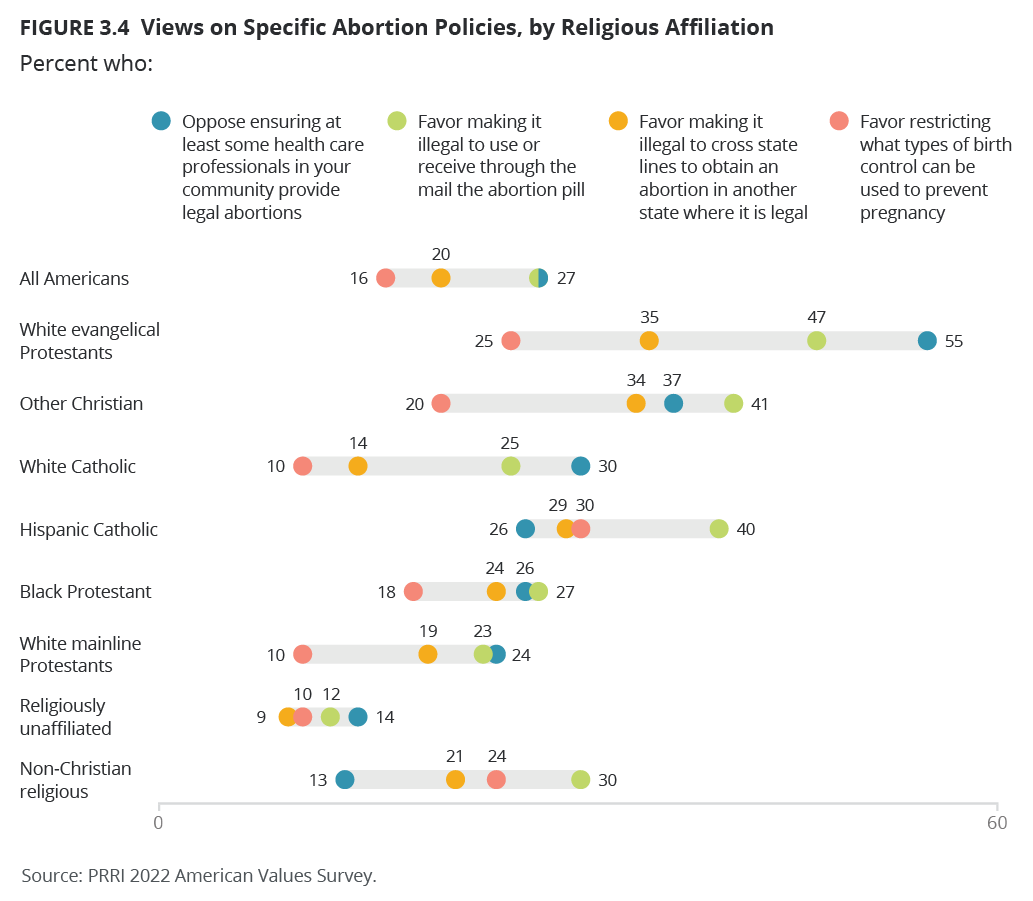
Race and Racism
Structural Racism
Generations of Slavery and Discrimination Have Created Conditions that Hinder Black Americans’ Economic Mobility
Americans are somewhat divided over the question of whether generations of slavery and discrimination have created conditions that make it difficult for Black Americans to work their way out of the lower class (45% agree, 51% disagree). Democrats are much more likely than Republicans to agree (72% vs. 16%), while Independents are divided (47% agree and 51% disagree).
White Christian subgroups are significantly less likely than other religious groups to agree with this statement. Minorities of white evangelical Protestants (19%), white Catholics (32%), and white mainline Protestants (36%) agree that the legacy of slavery and discrimination have limited Black Americans’ upward mobility. By contrast, majorities of Hispanic Catholics (52%), non-Christian religious Americans (57%), religiously unaffiliated Americans (60%), and Black Protestants (78%) agree with this statement.
White Americans are half as likely as Black Americans to agree that generations of slavery and discrimination have made it difficult for Black Americans to work their way out of the lower class (38% vs. 75%). Hispanic Americans and multiracial and other-race Americans are more evenly divided (51% and 45% in agreement, respectively). However, white Americans with at least a four-year college degree are more likely to agree than white Americans without a college degree (48% vs. 31%).
A Black Person Is More Likely to Get the Death Penalty
Nearly six in ten Americans (58%) believe a Black person is more likely than a white person to receive the death penalty for the same crime. There are substantial partisan disparities: only 31% of Republicans agree, compared with 60% of independents and 85% of Democrats.
Strong majorities of Black Protestants (87%), Hispanic Catholics (76%), the religiously unaffiliated (72%), and non-Christian religious Americans (70%) agree with this statement. A majority of Hispanic Protestants also agree (55%). White evangelical Protestants (33%), white mainline Protestants (47%), white Catholics (47%), and other Christian groups (46%) are the least likely to agree.
A slim majority of white Americans (51%) believe that a Black person is more likely to receive the death penalty than a white person is. A greater majority of Americans who are multiracial or another race agree (57%). Solid majorities of Hispanic Americans (68%) and Black Americans (77%) agree. White Americans with a college degree (62%) are more likely to agree than those without a four-year degree (45%).
Majorities of Americans who have a close friend (64%), a family member (61%), or another acquaintance (56%) of another race or ethnicity agree with the statement, whereas Americans whose social circles are less racially diverse are less likely to agree (51%).
So-Called Reverse Discrimination
A majority of Americans (57%) disagree that discrimination against white Americans has become as big a problem as discrimination against Black Americans and other minorities, compared with 39% of Americans who agree. Nearly two-thirds of Republicans (65%) agree with this statement, compared with 40% of independents and 14% of Democrats.
Among religious groups, six in ten white evangelical Protestants (61%) agree that discrimination against white Americans has become as big a problem as discrimination against racial minorities, as do 52% of white mainline Protestants and nearly half of white Catholics (48%). Less than half of other Christians (44%), non-Christian religious Americans (43%) and Hispanic Catholics (36%) agree. Agreement is lowest among Black Protestants, with 12% agreeing with the statement and 85% disagreeing.
Unsurprisingly, white Americans (46%) are significantly more likely than among Black Americans (13%), Hispanic Americans (33%), and Americans of other racial identities (39%) to say that discrimination against white Americans has become as big a problem as discrimination against Black Americans and other minorities. However, white Americans with a college degree are less likely than those without a college degree to agree with this sentiment (35% vs. 53%).
Agreement is particularly high among Americans who most trust far-right news outlets (79%) or Fox News (68%). Americans who do not trust any TV news or most trust mainstream outlets are much less likely to agree (42% and 28%, respectively).
White Supremacy Is Still a Major Problem
Most Americans agree with the statement that white supremacy is still a major problem in the United States today (58%), while 38% disagree. Republicans (30%) are significantly less likely than independents (60%) or Democrats (86%) to agree that white supremacy is a problem.
White evangelical Protestants (33%) are least likely to agree, and less than half of other Christians (49%) agree as well. Majorities of all other religious groups agree that white supremacy remains a problem, including Black Protestants (88%), Hispanic Catholics (73%), those affiliated with non-Christian religions (72%), those unaffiliated with any religious tradition (71%), and white mainline Protestants (54%), as well as half of white Catholics (50%).
More than three in four Black Americans (78%) agree that white supremacy is still a problem today, while white Americans are more divided (52% agree and 45% disagree). Majorities of Hispanic Americans and Americans of other races also agree (65% and 61%, respectively).
White Americans with at least a four-year college degree (55%) are somewhat more likely to agree than are those without a college degree (50%). The effect of college education is greater among all Americans: agreement is lower among those with no college experience (55%) and those with some college but no degree (56%) than among Americans with a college degree (63%) or a postgraduate degree (63%).
Americans with close friends (63%) or family members (59%) of other races or ethnicities are more likely than those without such relationships (54%) to agree that white supremacy is a problem in the United States today.
Americans Today and Responsibility for Slavery and Discrimination
More than two thirds of Americans (68%) agree that white Americans today bear no responsibility for slavery or discrimination against Black people in the past, while 27% disagree. An overwhelming majority of Republicans (87%) agree, as do 72% of independents and 52% of Democrats. There are few differences across religious lines.
White Americans (73%) are most likely to agree that they bear no responsibility for slavery and past discrimination, though majorities of Hispanic Americans (67%) and Americans of other racial identities (64%) also agree. Black Americans are more divided on the issue (48% agree vs. 44% disagree).
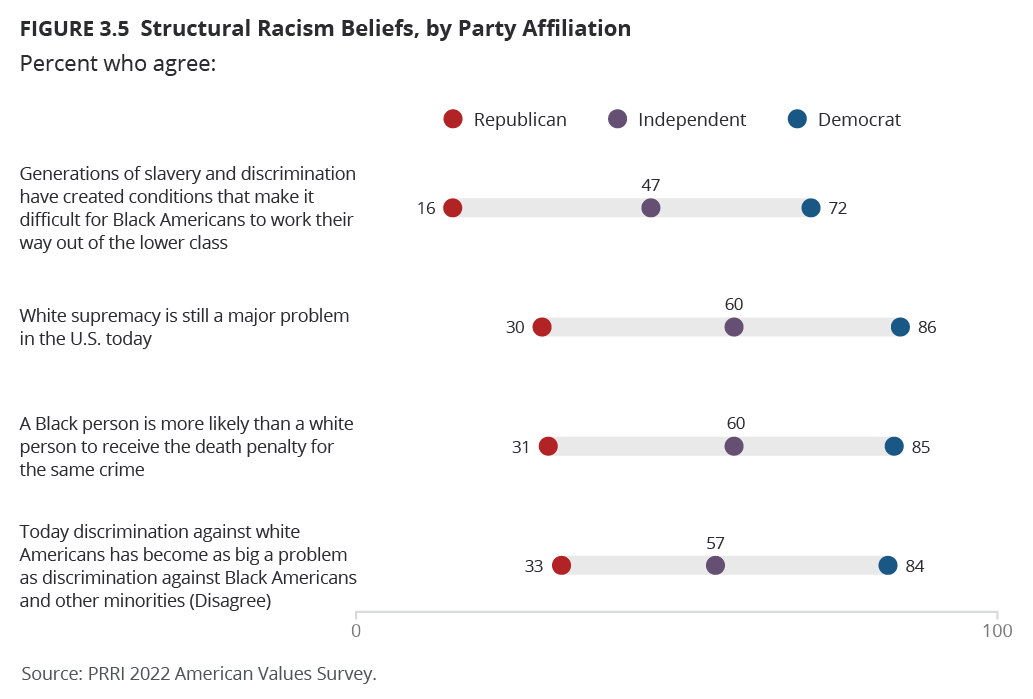
Critical Race Theory
Almost half of Americans (45%) say they have seen, read, or heard a little about critical race theory, 34% say they have not heard anything about it, and 19% say they have heard a lot about it.
There are no significant partisan differences. About one in five Republicans (22%), independents (18%), and Democrats (22%) say they have heard a lot about the issue, while just less than half of each group say they have heard a little about it (46%, 47%, and 47%, respectively). Roughly 3 in 10 of Republicans, independents, and Democrats say they have heard nothing about critical race theory (31%, 34%, and 31%, respectively).
The starkest differences emerge with respect to educational history. Half of Americans with high school degrees or less (50%) say they have heard nothing about critical race theory, compared with 30% of Americans with some college experience but no degree, 21% of Americans with a college degree, and 17% of Americans with a postgraduate degree.
Americans who most trust far-right news outlets are the most likely to say they have heard a lot about “critical race theory” (42%), along with 29% of Americans who most trust Fox News. Less than two in ten Americans who most trust mainstream outlets (18%) or trust non-television news sources (16%) say the same.
Teaching History
Americans overwhelmingly favor teaching children history that includes both the good and bad aspects of our history so that they can learn from the past, versus refraining from teaching aspects of history that could make them feel uncomfortable or guilty about what their ancestors did in the past (92% vs. 5%).
There are no substantial partisan differences, though Republicans favor excluding aspects of history slightly more (7%) than Democrats and Independents (both 4%). There are few differences across religious traditions or demographics.
This consensus holds up across different levels of exposure to critical race theory: 92% of those who have heard a lot about critical race theory, 94% of those who have heard a little, and 93% of those who have heard nothing about it state that we should teach children the good and bad of history.
Public School Teachers and Librarians
Two-thirds of Americans (66%) believe that public school teachers and librarians provide students with appropriate curricula and books that teach the good and bad of American history, while 29% believe that they are indoctrinating students with inappropriate curricula and books that wrongly portray America as a racist country. However, a majority of Republicans (54%), compared with 27% of independents and only 7% of Democrats, believe that teachers and librarians are indoctrinating children.
A slim majority of white evangelical Protestants (51%) say public school teachers and librarians are indoctrinating children. Less than four in ten white Catholics (38%) and other Christians (38%) agree, as do three in ten white mainline Protestants (30%). No more than one in five Hispanic Catholics (20%), religiously unaffiliated Americans (19%), non-Christian religious Americans (18%), and Black Protestants (15%) believe that public school teachers and librarians are indoctrinating children with inaccurate portrayals of America as a racist country.
One-third of white Americans (33%) believe that public school teachers and librarians are indoctrinating children, compared with 30% of Americans who are multiracial or another race, 23% of Hispanic Americans, and 15% of Black Americans. More than one-third of white Americans with no college degree hold his view (36%), compared with 27% of those with a college degree.
Disparities on this question also emerge according to differences in exposure to news coverage of critical race theory. Those who state that they have seen, read, or heard a lot about critical race theory are more than twice as likely as those who have heard nothing about it to believe that public school teachers and librarians are indoctrinating children (44% vs. 21%).
Americans who most trust far-right news outlets are especially likely to say that public school teachers and librarians are indoctrinating children (82%), along with 60% of Americans who most trust Fox News. Americans who do not trust any TV news or most trust mainstream outlets are much less likely to say this (35% and 13%, respectively).
LGBTQ Issues
Nondiscrimination Protections
About three in four Americans (76%) favor laws that would protect gay, lesbian, bisexual, and transgender people against discrimination in jobs, public accommodations, and housing, including 47% who strongly support such protections. One in five Americans (20%) oppose such laws, including 9% who strongly oppose them. Support for these protections has increased over the past few years: around seven in ten Americans favored nondiscrimination provisions in 2015 (71%), 2017 (70%), 2018 (69%), and 2019 (72%), and the percentage rose to 76% in 2020 and 79% in 2021.
Most Democrats (88%), independents (80%), and more than six in ten Republicans (63%) favor nondiscrimination protections for LGBTQ people. Since 2015, support has increased ten percentage points among Democrats (78% to 88%) and seven percentage points among independents (73% to 80%). By contrast, support among Republicans has remained about the same (61% to 63%).
Majorities of every major religious group support nondiscrimination protections for LGBTQ people, including religiously unaffiliated Americans (86%), members of non-Christian religions (85%), white Catholics (80%), Hispanic Catholics (80%), white mainline Protestants (78%), Black Protestants (74%), and other Christians (67%). Six in ten white evangelical Protestants (60%) also favor nondiscrimination protections for LGBTQ people.
There are few differences by race and ethnicity. More than seven in ten multiracial and other-race Americans (77%), white Americans (77%), Hispanic Americans (73%), and Black Americans (71%) support nondiscrimination protections for LGBTQ people. White Americans with a four-year college degree or higher are notably more likely than those without a four-year degree to support these protections (83% vs. 73%).
Support for nondiscrimination protections for LGBTQ people increases with education. Two-thirds of Americans with a high school degree or less (67%) support these protections, as do 77% of Americans with some college experience, 84% of Americans with a four-year college degree, and 85% of Americans with a postgraduate degree.
Americans who know someone who is gay, lesbian, or bisexual (82%) or transgender (85%) are notably more likely to support nondiscrimination protections for LGBTQ people than those who don’t know any gay, lesbian or bisexual people (61%) or transgender people (74%).[3]
Beliefs About Gender Identity
A majority of Americans (62%) believe that there are only two genders (male and female), including 44% who feel strongly that this is the case and an additional 18% who do not feel strongly about it. More than one-third of Americans (35%) say there is a range of genders, including 22% who think this but do not feel strongly about it and 13% who feel strongly. These beliefs are generally unchanged since 2021.
Nearly nine in ten Republicans (88%) believe that there are two genders, including 73% who feel strongly about it. Just 10% of Republicans believe there is a range of gender identities. By contrast, only 36% of Democrats believe there are just two genders, including 21% who feel strongly that gender is binary. A majority of Democrats (62%) believe there is a range of gender identities, and 27% feel strongly about it. Independents closely mirror all Americans, with 62% believing that there are two genders, including a 40% plurality who feel strongly about it. More than one-third of independents (36%) feel that there is a range of gender identities, including 10% who strongly feel about it.
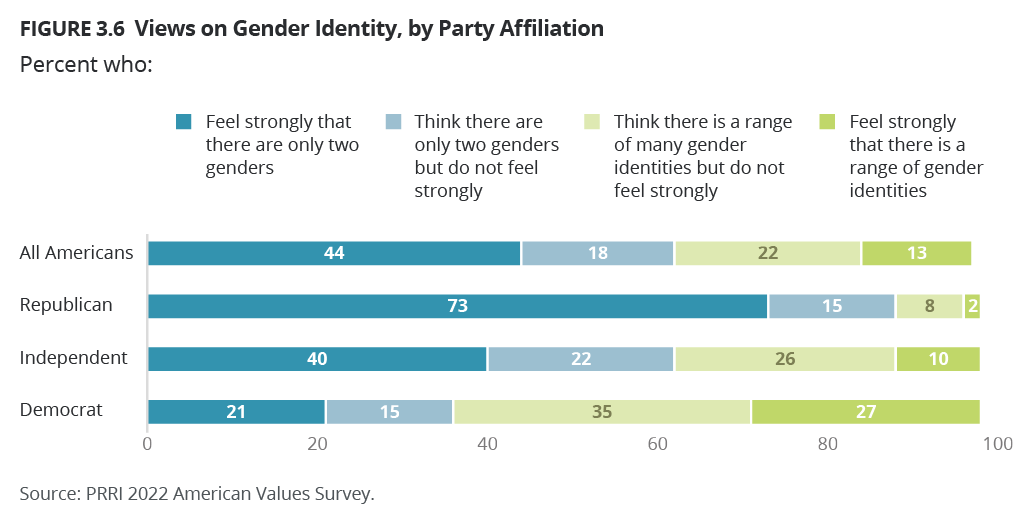
Nearly nine in ten white evangelical Protestants (87%), three in four Black Protestants (76%), and about seven in ten other Christians (74%), white Catholics (70%), and white mainline Protestants (68%) believe that there are only two genders, compared with 51% of Hispanic Catholics, 45% of religiously unaffiliated Americans and 39% of members of non-Christian religions.
Majorities of Black Americans (68%), white Americans (65%), and Hispanic Americans (55%), believe that there are only two genders, compared with 50% of multiracial and other-race Americans. White Americans are particularly divided along education lines: 69% of white Americans without a four-year college degree say there are only two genders, compared with 57% of white Americans with at least a four-year college degree.
Belief in a gender binary generally increases with age. Americans ages 18–29 are the least likely to believe that there are only two genders (53%), compared with 60% of those ages 30–49, 68% of Americans ages 50–64, and 65% of Americans over age 65. Men (68%) are more likely than women (57%) to believe that there are only two genders.
Americans who know someone who is gay, lesbian, or bisexual (60%), and particularly those who know someone who is transgender (47%), are significantly less likely than those who don’t know any gay, lesbian or bisexual people (71%) or transgender people (70%) to say that there are two genders.
Bathroom Accommodations
Americans continue to be divided over policies that would require transgender individuals to use bathrooms that correspond to their sex at birth rather than their current gender identity (52% favor, 44% oppose). Strikingly, despite increasing support for LGBTQ rights generally, Americans are moving in the opposite direction on this specific question. Americans are 17 percentage points more likely to favor such policies today than they were in 2016, when the question was first asked (35% favor, 53% oppose).
Compared with responses from 2016, support for restrictive bathroom policies is notably higher among Republicans and independents. The biggest shift is among Republicans, who are 30 percentage points more likely to favor requiring transgender individuals to use bathrooms that correspond to their sex at birth (from 44% in 2016 to 74% in 2022). Independents are also more likely to support these policies today (55%) than they were in 2016 (37%). Democrats (31% in 2022) have not shifted significantly since 2016 (27%).
With the exception of religiously unaffiliated Americans (34%), at least half of members of all religious groups support requiring transgender individuals to use bathrooms that correspond to their sex at birth, including three in four white evangelical Protestants (75%), 64% of other Christians, 58% of white mainline Protestants, 57% of Black Protestants (57%), 53% of white Catholics, 51% of Hispanic Catholics, and 50% of non-Christian religious Americans.
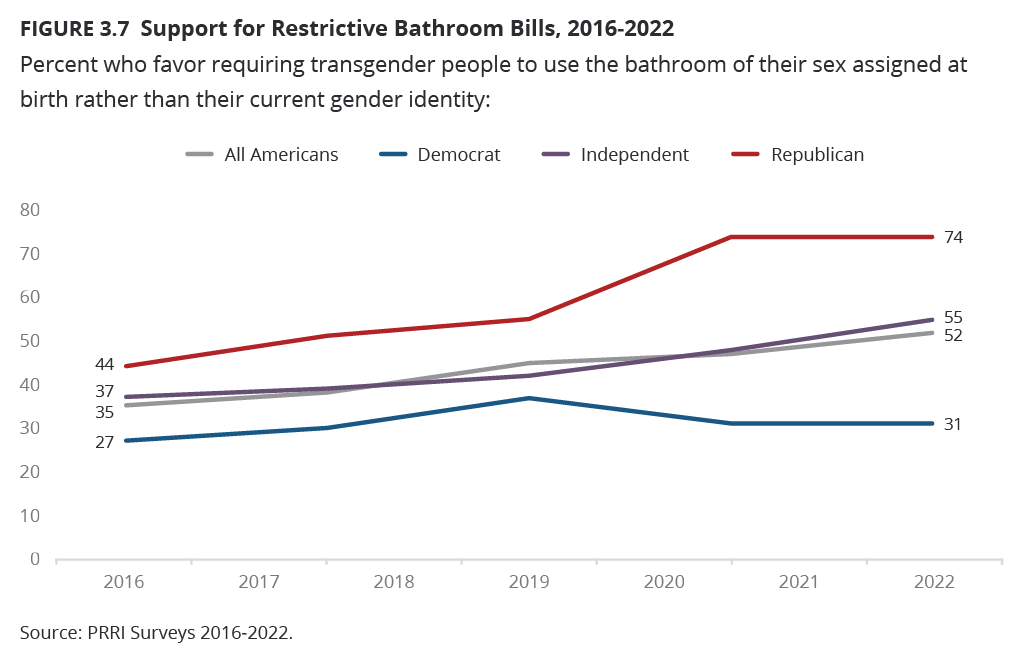
Similarly, slim majorities of Americans who are multiracial or another race (53%), Hispanic Americans (52%), and white Americans (51%), along with half of Black Americans (50%), support restrictive bathroom policies. However, white Americans with a college degree are notably less likely than those without a college degree to support restrictive bathroom policies (46% vs. 55%).
Support for restrictive bathroom policies increases with age. Americans ages 18–29 (39%) are least supportive, while half of Americans ages 30–49 (50%) support these restrictions, as do majorities of Americans ages 50–64 (58%) and Americans over age 65 (59%). Men (58%) are more likely than women (46%) to support restrictive bathroom policies.
Nearly seven in ten Americans who believe that there are only two genders (69%) also support restrictive bathroom policies, compared with only about one in four among those who believe that there is a range of gender identities (23%).
Americans who know someone who is gay, lesbian, or bisexual (49%), and particularly those who know someone who is transgender (39%), are notably less likely to support restrictive bathroom policies than those who don’t know any gay, lesbian, or bisexual people (66%) or transgender people (60%).
Americans who most trust far-right news outlets are notably more likely to support requiring transgender individuals to use bathrooms that correspond to their sex at birth rather than their current gender identity (84%), along with 78% of Americans who most trust Fox News. Americans who do not trust any TV news or most trust mainstream outlets are much less likely to support restrictive bathroom policies (52% and 44%, respectively).
Preventing Medical Care for Gender Transition Among Children
More than four in ten Americans (44%) support laws that would prevent parents from allowing their child to receive medical care for a gender transition, compared with a slim majority who oppose these laws (53%). Republicans (61%) are about three times as likely as Democrats (22%) to support these laws, while independents closely resemble all Americans (46%).
White evangelical Protestants (59%) and other Christians (54%) are the only two religious groups in which majorities support these laws. Nearly half of Black Protestants (48%), 46% of white mainline Protestants, 43% of white Catholics and Hispanic Catholics, 42% of members of non-Christian religions, and 32% of religiously unaffiliated Americans also support preventing parents from allowing their child to receive medical care for gender transition.
Interestingly, both young Americans ages 18–29 (41%) and seniors age 65 and older (38%) are less likely to support these laws than Americans ages 30–49 (46%) and 50–64 (48%). Women (40%) are also less likely than men (47%) to support these laws.
Not surprisingly, a majority of Americans who believe that there are only two genders (57%) also support laws that prevent medical care for gender transition for children, compared with only 21% of Americans who believe that there is a range of gender identities.
Americans who say they know someone who is transgender (36%) are significantly less likely to support these laws than those who don’t know anyone who is transgender (47%). A majority of Americans who most trust far-right news outlets (71%) support laws that would prevent parents from allowing their child to receive medical care for a gender transition, along with 60% of Americans who most trust Fox News. Americans who do not trust any TV news or most trust mainstream outlets are much less likely to support this policy (49% and 34%, respectively).
Immigration’s Impact on American Culture and Life
“Great Replacement” Theory
Three in ten Americans (30%) agree with the statement “immigrants are invading our country and replacing our cultural and ethnic background,” compared with 64% who disagree. Agreement has decreased significantly from 36% in 2019, when PRRI first asked this question.
A majority of Republicans (55%) agree with this view, which is known as Great Replacement Theory, compared with only 27% of independents and 12% of Democrats. Partisans’ agreement with this theory has declined significantly since 2019, when 63% of Republicans, 20% of Democrats, and 31% of independents agreed.
White evangelical Protestants (51%) stand out as the only religious group in which a majority agree that immigrants are invading our country and replacing our cultural and ethnic background. While a little more than four in ten white mainline Protestants (41%) and white Catholics (41%) agree with this statement, just 26% of other Christians, 21% of members of non-Christian religions, 21% of religiously unaffiliated Americans, 19% of Black Protestants, and 19% of Hispanic Catholics agree.
More than one-third of white Americans (36%), 22% of multiracial and other-race Americans, 21% of Hispanic Americans, and 19% of Black Americans agree with Great Replacement Theory. White Americans without four-year college degrees are about twice as likely to agree as those with a four-year college degree or higher (43% vs. 26%).
Not surprisingly, Americans who are immigrants themselves or know someone who is a documented (27%) or undocumented immigrant (26%) are notably less likely to agree than those who don’t know any immigrants (38% and 33%).
American Way of Life Needs to Be Protected from Foreign Influence
Americans are divided over the statement “the American way of life needs to be protected from foreign influence,” with 47% agreeing and 48% disagreeing. Republicans (72%) are much more likely than Democrats (28%) to agree, while independents fall in between (44%).
Within white Christian groups, majorities agree that the American way of life needs to be protected, including 65% of white evangelical Protestants, 59% of white Catholics, and 55% of white mainline Protestants. By contrast, less than half of Black Protestants (46%), 45% of other Christians, 39% of members of non-Christian religions, 38% of Hispanic Catholics, and 35% of religiously unaffiliated Americans also agree.
Immigration Policies
Pathway to Citizenship
Nearly six in ten Americans (57%) say that immigrants living in the United States illegally should be given a way to become citizens, provided they meet certain requirements. More than one in ten say they would prefer undocumented immigrants to be eligible for permanent residency status but not citizenship (13%), and one in four say all immigrants living in the country illegally should be identified and deported (25%). Support for a pathway to citizenship for undocumented immigrants has remained remarkably consistent since 2013, from a low of 57 in 2022 and 2015 to a high of 67 in 2019.
Democrats have grown more supportive of a path to citizenship for undocumented immigrants, with support increasing from 71% in 2013, when the question was first asked, to 77% today. By contrast, Republicans (40%) have become less supportive than they were in 2013 (53%). Today, 10% of Republicans say they would prefer undocumented immigrants to be eligible for permanent residency status but not citizenship, and nearly half (48%) say all immigrants living in the U.S. illegally should be deported, an increase from 44% in 2021 and 32% in 2013.
Majorities of almost all religious groups support allowing undocumented immigrants to become citizens, including three in four Black Protestants (73%), 66% of religiously unaffiliated Americans, 62% of Hispanic Catholics (down from 70% in 2021), 60% of members of non-Christian religions, 58% of other Christians (down from 65% in 2021), 54% of white mainline Protestants, and 54% of white Catholics. White evangelical Protestants (42%) stand out as the only religious group in which a majority does not support a path to citizenship for undocumented immigrants.
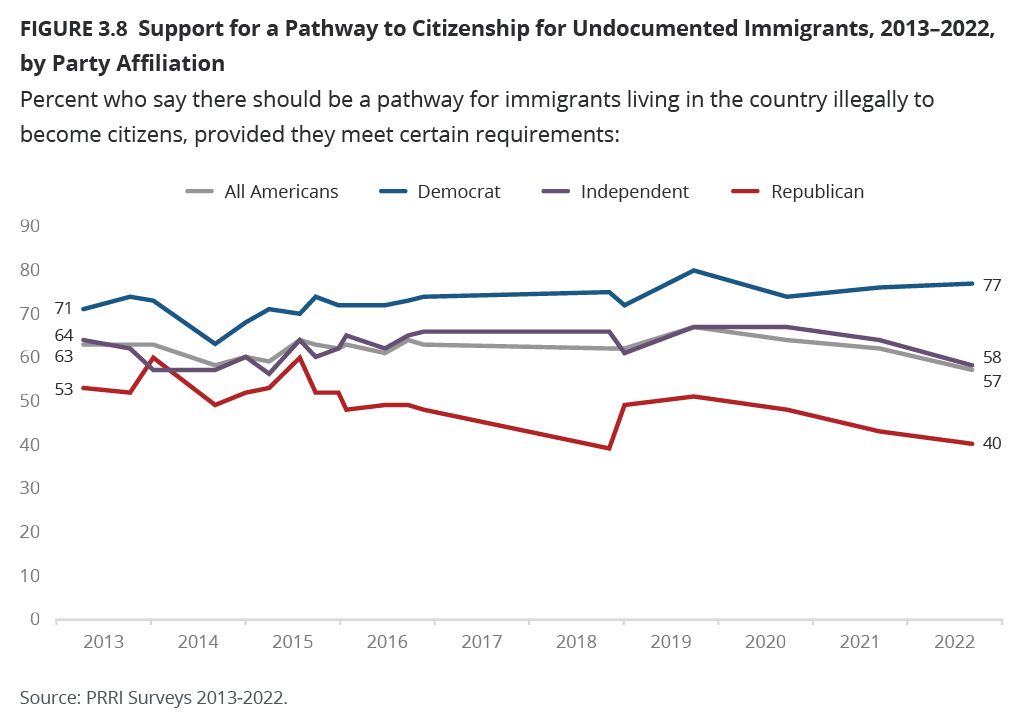
Pathway to Citizenship for Dreamers?
Children brought illegally to the United States by their parents, also known as Dreamers, are eligible for temporary legal status but have to renew their status every two years. When informed of these facts, a plurality of Americans (41%) say the policy should be changed to allow children of undocumented immigrants to apply for citizenship or permanent resident status. About one-third of respondents (32%) say the policy should be left as it is, and about one in five (22%) say those brought to the country illegally as children should be identified and deported.
Democrats (66%) are more than three times as likely as Republicans (18%) to support a pathway to citizenship for Dreamers. By contrast, 37% of Republicans and 28% of Democrats say the policy should be left as it is. Just 5% of Democrats say that these immigrants should be identified and deported, compared with more than four in ten Republicans (43%). Independents closely resemble all Americans on this issue, with a 42% plurality supporting a pathway to citizenship or permanent residency, 35% supporting the program as-is, and 19% supporting deportation.
A majority of Black Protestants (57%), Hispanic Catholics (55%), and religiously unaffiliated Americans (54%) support a pathway to citizenship for Dreamers, compared with 42% of other Christians, 40% of members of non-Christian religions, 35% of white mainline Protestants, and 30% of white Catholics. White evangelical Protestants are the least likely to support establishing a pathway to citizenship (21%) and the most likely to say undocumented children of immigrants should be identified and deported (40%).
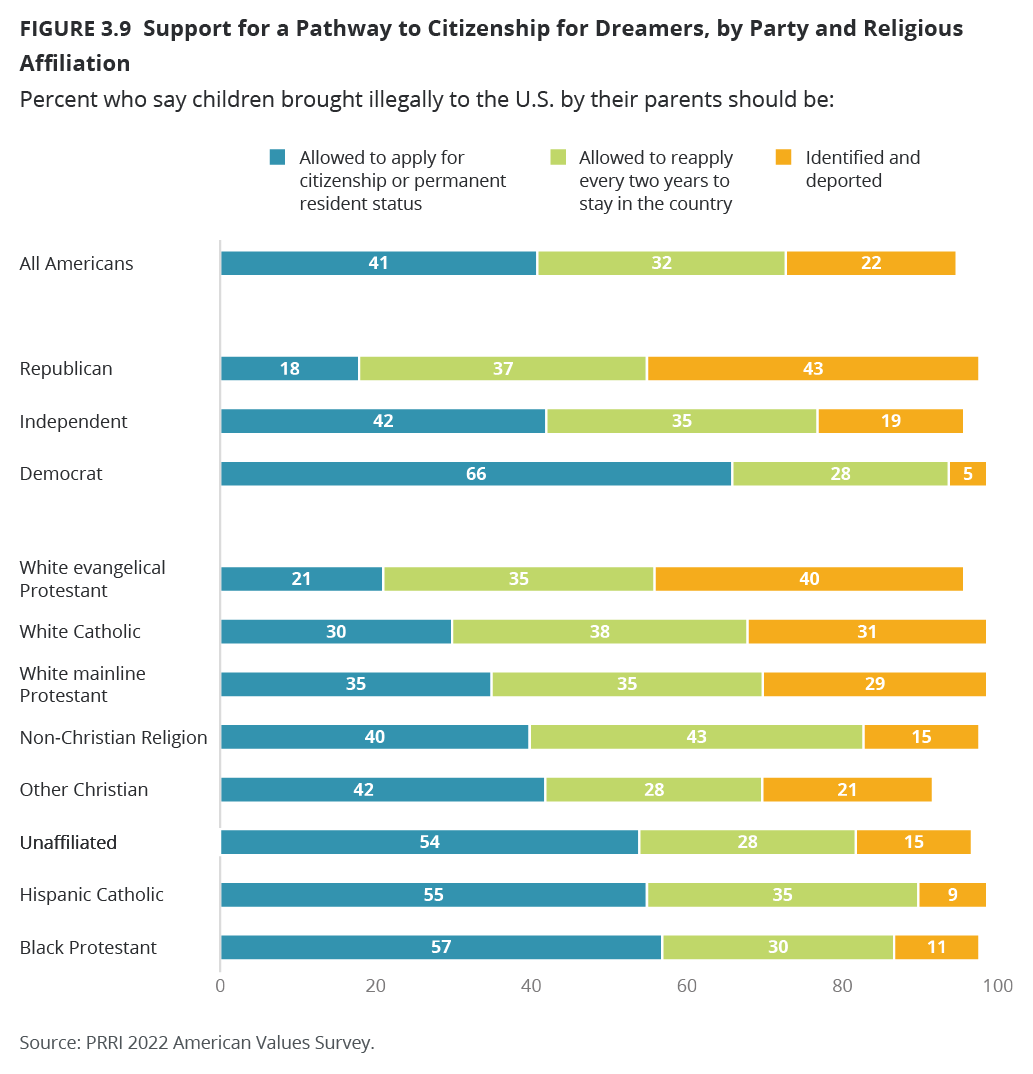
While slim majorities of Black Americans (53%) and Hispanic Americans (52%) support a pathway to citizenship or residency for Dreamers, less than four in ten white Americans (37%) and Americans of other races (36%) do. White Americans with a college degree are notably more likely to support this policy than whites without a college degree (46% vs. 32%).
The majority of young Americans ages 18–29 (54%) support a pathway to citizenship or residency, compared with 45% of Americans ages 30–40, 33% of those ages 50-64, and 34% of Americans 65 years and over. Women are notably more likely than men to agree with this policy (45% vs. 38%).
Not surprisingly, respondents who are undocumented immigrants themselves or know someone who is an undocumented immigrant (50%) are notably more likely to support a pathway to citizenship for Dreamers than those who do not (39%). The same is true of those who are documented immigrants or know someone who is a documented immigrant (44%), compared with those who don’t know any documented immigrants (38%).
Americans who most trust far-right news outlets (12%) and Americans who most trust Fox News (13%) are the least likely to support a pathway to citizenship for Dreamers. Americans who most trust mainstream outlets and those who do not trust any TV news are much more likely to support this policy (53% and 40%, respectively).
Views of the Biden Administration
Democrat Leaders’ Favorability
President Biden
Four in ten Americans (40%) view President Biden favorably, compared with 55% who view him unfavorably. Biden’s favorability ratings have declined significantly since he was first inaugurated as president, in January 2021, when favorability was at 55%, and responses are deeply divided along party lines. While the vast majority of Democrats (82%) view Biden favorably, only 7% of Republicans do. Independents mirror all Americans (40%).
Biden’s favorability levels are highest among Black Protestants (69%), members of non-Christian religions (60%), Hispanic Catholics (58%), and religiously unaffiliated Americans (49%). By contrast, white Christian groups and other Christians show the lowest favorability ratings, with one-third of white Catholics (36%), other Christians (32%), and white mainline Protestants (32%), and just 15% of white evangelical Protestants expressing favorable views.
Black Americans (60%) are the racial/ethnic group whose members are most likely to view Biden favorably, followed by Hispanic Americans (50%) and Americans of other races (47%). One-third of white Americans (34%) view Biden favorably, but those with a college degree are notably more likely to do so than those without a college degree (45% vs. 26%).
Only one-third (33%) of young Americans ages 18–29 view Biden favorably, compared with 43% of Americans ages 30–40, 44% of Americans ages 50–64, and 42% of senior Americans ages 65 and over.
Vice President Harris
About four in ten Americans (38%) view Vice President Kamala Harris favorably, compared with 55% who view her unfavorably. Vice President Harris’s favorability levels have consistently declined in the past year, from 52% in August 2021 to 45% in September 2021 and 38% today. Again, partisans are deeply divided in their views. While 77% of Democrats view Harris favorably, just 7% of Republicans do. One-third of independents (33%) view Harris favorably.
Majorities of Black Americans (60%) have favorable views of Harris, compared with 44% of Hispanic Americans, 41% of multiracial and other-race Americans and only 31% of white Americans. White Americans with a four-year college degree or higher are notably more likely to express favorable opinions of Harris than those without a four-year degree (40% vs. 25%).
Speaker Pelosi
Favorability ratings of Nancy Pelosi, the speaker of the United States House of Representatives, have remained consistently low. Only one-third of Americans (32%) view Pelosi favorably, and these ratings have dropped significantly since the question was first asked, in September 2019, when her favorability was at 39%. Just 5% of Republicans view Pelosi favorably, compared with 27% of independents and 74% of Democrats.
Former President Obama
Former President Barack Obama’s favorability ratings are much higher than those of current Democratic leaders in office. A majority of Americans (55%) have favorable views of the former president, compared with 43% who express unfavorable views. Even though deep partisan divides persist, Republicans are more than twice as likely to view Obama favorably (18%) as they are Biden (7%) or Harris (7%). Significantly more Democrats (93%) and independents (60%) view Obama favorably than view Biden (82% and 40%) or Harris (77% and 33%) favorably.
Biden’s Job Approval
More than four in ten Americans (43%) approve of the job Biden is doing as president, compared with 53% who disapprove. Biden’s job approval has declined significantly since September 2021, when 52% approved and 48% disapproved. Just 7% of Republicans approve of the job Biden is doing, compared with 45% of independents, and the vast majority of Democrats (84%).
Around four in ten Americans (39%) approve of the job President Biden is doing handling the issue of abortion, compared with 57% who disapprove. While 69% of Democrats and 40% of independents approve of Biden’s handling of abortion, just 12% of Republicans do.
Approval of the job Biden is doing handling immigration has remained somewhat consistent over time, with 37% of Americans approving and 59% disapproving in 2022. Eight percent of Republicans approve of Biden’s handling of immigration, compared with more than one-third of independents (36%) and three-quarters of Democrats (73%).
Around four in ten Americans (39%) approve of Biden’s handling of the economy, compared with 59% who disapprove. Approval on this issue has declined significantly from September 2021, when 50% approved and 49% disapproved. Just 6% of Republicans approve, compared with one-third of independents (34%) and nearly eight in ten Democrats (79%).
The American public is divided over Biden’s handling of the COVID-19 pandemic (53% approve, 44% disapprove), and these views have remained consistent since September 2021 (56% approve, 42% disapprove). One in five Republicans (20%), 55% of independents, and 88% of Democrats approve of Biden’s handling of the pandemic.
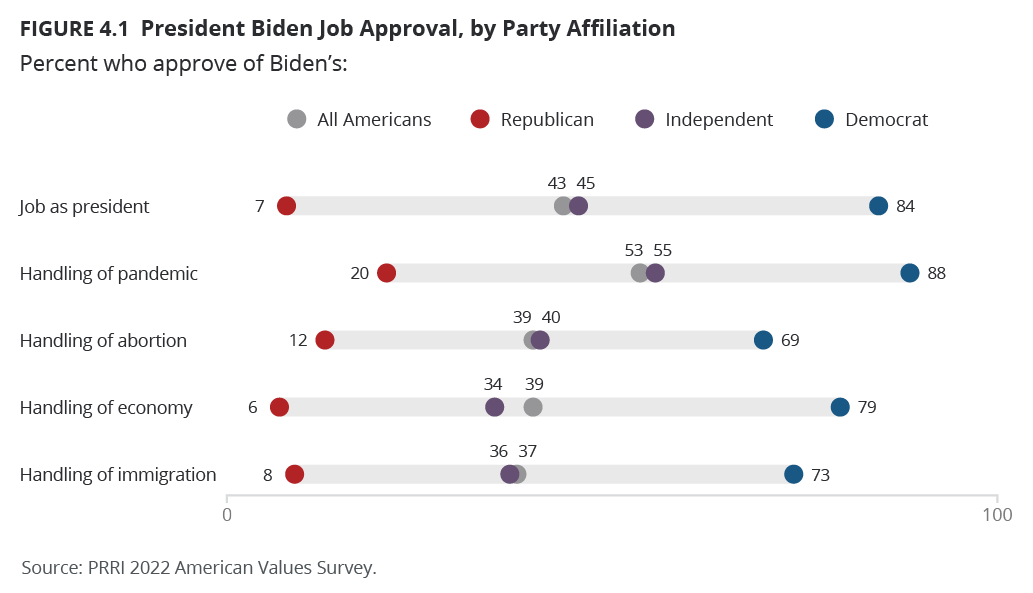
Biden as a Democratic Nominee in 2024
More than two-thirds of Democrats and Democrat-leaning independents (68%) say someone other than Biden should be the Democratic presidential nominee in 2024, compared with about three in ten who say Biden should be the nominee (31%). Even among Democrats and Democrat-leaning independents who have favorable views of Biden, just 40% say they would like him to be the nominee in 2024, while 58% say they would prefer someone else.
Democrats are twice as likely as Democrat-leaning independents to say Joe Biden should be the Democratic nominee in 2024 (40% vs. 20%). However, a majority of both Democrats (58%) and Democrat-leaning independents (78%) would prefer that someone else be the nominee.
Support for Biden to be the 2024 nominee increases with age. Democrats and Democrat-leaning independents ages 18-29 are least likely to want Biden to be the Democratic nominee in 2024, with only 22% expressing this view, compared with twice as many over age 65 (39%). Democrats and Democrat-leaning independents ages 30–49 (28%) and ages 50–64 (38%) fall in between.
The Elephant In the Room: Trump and His Hold on the Republican Party
Views of Trump
Americans’ views of former President Donald Trump are roughly in line with where they were when he was in office. Currently 35% of Americans hold favorable views of Trump and 62% hold unfavorable views, including around half of Americans (48%) who say they view Trump very unfavorably. Trump’s favorability has remained remarkably stable: A year ago, in September 2021, 36% of Americans held favorable views and 62% held unfavorable views
Trump’s Republican base still expresses broadly positive views of him: three in four Republicans (76%) express favorable views, including 40% who feel very favorably toward Trump. Just under three in ten independents (28%) and few Democrats (5%) view Trump favorably.
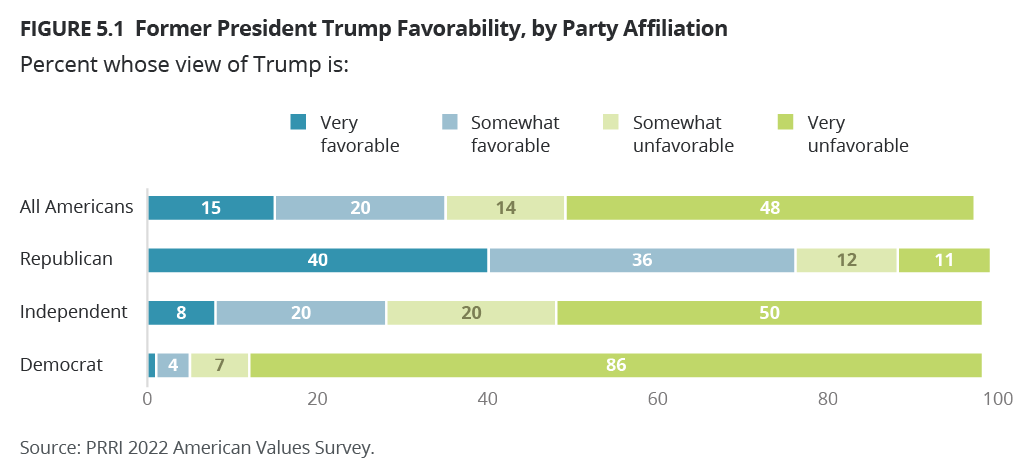
Americans who most trust far-right news outlets overwhelmingly have favorable views of Trump (90%), as do more than three quarters of Americans who most trust Fox News (78%). Americans who do not trust any TV news or most trust mainstream outlets are much less likely to hold favorable views of Trump (40% and 15%, respectively).
White evangelical Protestants are the only major religious group in which a majority of adherents say they view Trump favorably (63%), roughly similar to the share in 2021 (67%). However, the share of white evangelicals who view Trump very favorably has declined somewhat, from 41% in 2021 to 32% currently. Less than half of white mainline Protestants (48%) and white Catholics (42%) view Trump favorably. Less than four in ten other Christians (36%), non-Christian religious Americans (23%), Hispanic Catholics (22%), and religiously unaffiliated Americans (22%) say they view Trump favorably.
White Americans (41%) are more likely than Black Americans (12%), Hispanic Americans (25%), or Americans who are multiracial or another race (35%) to hold favorable views of Trump. Half of white Americans who do not hold a four-year college degree (48%) view Trump favorably, compared with a significantly lower percentage of Americans with a four-year college degree or higher (29%).
The Big Lie
Just under three in ten Americans (28%) agree that the 2020 presidential election was stolen from Donald Trump. This share is essentially unchanged from a year ago, when 31% of Americans said the election was stolen from Trump. A majority of Republicans (58%) falsely claim that the election was stolen from Trump, compared with around one in four independents (24%) and 4% of Democrats.
A majority of white evangelical Protestants (54%) claim that the 2020 election was stolen from Trump, but the percentage is significantly lower among adherents of other major religious groups, including white mainline Protestants (37%), white Catholics (32%), and religiously unaffiliated Americans (19%).[4]
Belief that the 2020 election was stolen from Trump is predominantly concentrated among white Americans (34%), particularly white Americans without a four-year college degree (43%). White Americans with at least a four-year college degree (21%), Hispanic Americans (15%), and Black Americans (14%) are all less likely to believe the election was stolen from Trump.
A Second Term for Trump?
Republicans and Republican-leaning independents are divided over whether they want Donald Trump to be the presidential nominee in the 2024 election. Just less than half of Republicans and Republican-leaning independents (47%) say Trump should be the nominee, while a slim majority say they would prefer someone else (52%).
Those who voted for Trump in the 2020 election are somewhat more likely to prefer Trump (56%) over another nominee (43%). Republicans (54%) are substantially more likely than Republican-leaning independents (36%) to prefer Trump as the 2024 nominee.
Support for Trump to be the 2024 nominee is closely tied to media trust. Republicans and Republican-leaning independents who most trust far-right news outlets broadly want Trump to be the nominee (72%). Comparatively fewer Republicans and Republican-leaning independents who most trust Fox News prefer Trump (56%). Half of Republicans and Republican-leaning independents who do not trust any TV news outlets (50%) prefer Trump to be the nominee, compared with around half as many who most trust mainstream news outlets (27%).
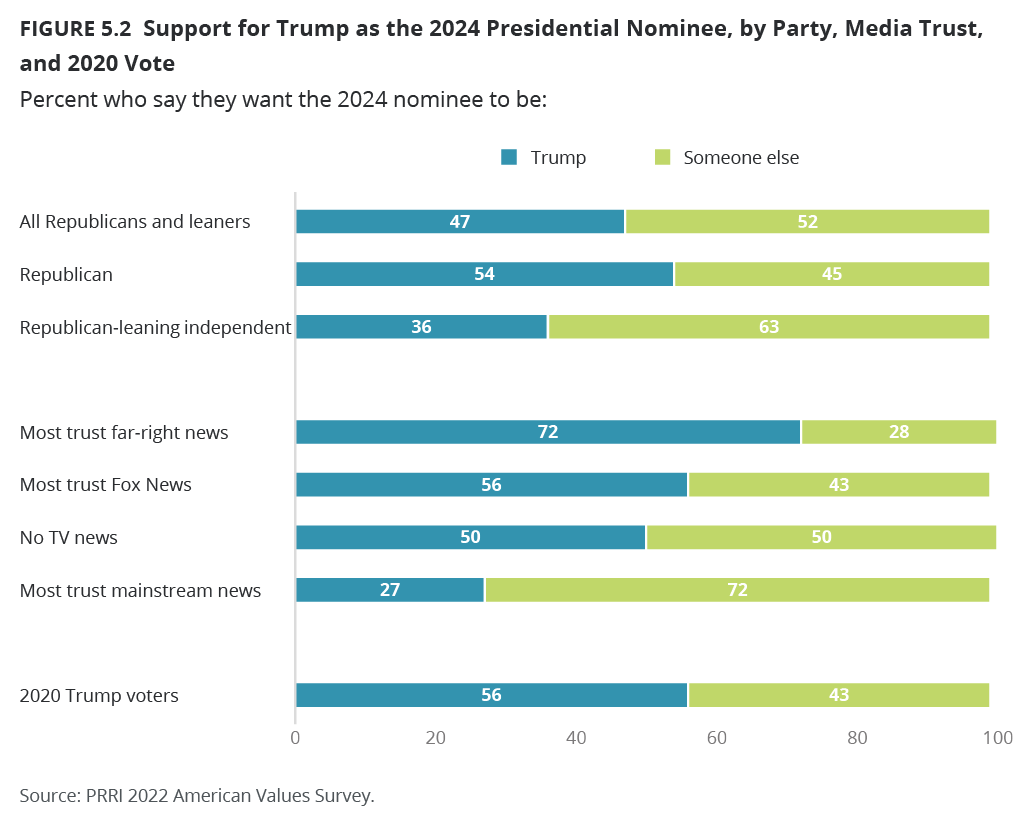
White evangelical Protestant Republicans and Republican-leaning independents have consistently expressed strong support for Trump in general but divide evenly in their preferences for 2024: 49% say they prefer Trump to be the nominee and 50% say they prefer someone else. White mainline Protestant Republicans and Republican-leaning independents express an identical divide (49% prefer Trump, 50% prefer someone else). Less than half of white Catholics who are Republicans or Republican leaning (45%) and of religiously unaffiliated Republicans and Republican leaners (42%) prefer Trump as the 2024 nominee.
White Republicans and Republican-leaning independents are deeply divided along educational lines over whether they prefer Trump as the nominee in 2024. Just one-third of those with a four-year college degree or a postgraduate degree (32%) prefer Trump, compared with a majority of those who do not have a four-year degree (53%).
Attitudes Toward the Jan. 6 Congressional Hearings
Americans are deeply divided along partisan lines in their impressions of the Congressional hearings on the Jan. 6, 2021,, attack on the U.S. Capitol. Americans are somewhat more likely to say that the hearings are important and that people need to understand what happened that day (52%) than they are to say the hearings are politically motivated and a waste of time (43%). Most Americans also say that their impressions of Trump have not changed because of the hearings (56%), while around one-third say their views of Trump became less favorable (32%), and 8% say their views of Trump became more favorable.
Partisan groups divide in their interpretations of the January 6th hearings: just two in ten Republicans say that the Congressional hearings are important and needed (20%), compared with a solid majority of independents (56%) and more than eight in ten Democrats (84%).
Nearly two-thirds of Republicans (64%) say that the hearings did not change their opinion about Trump, while 14% say their views of Trump became less favorable, and 20% say they became more favorable. Democrats are more divided: 46% say the hearings did not change their opinion about Trump, while 51% feel less favorably, and just 1% became more favorable toward Trump. Independents’ impressions of Trump shifted similarly to those of all Americans.
Media trust has clear ties to Americans’ views of the Jan. 6 hearings. Just 5% of Americans who most trust far-right news outlets, 17% of those who most trust Fox News, and 41% of those who do not trust any TV news outlets say that the hearings are important and needed. In comparison, three-quarters of Americans who most trust mainstream news outlets say the hearings are important and necessary (78%).
More than six in ten Americans who most trust Fox News (66%), far-right news outlets (63%), or no TV news outlets (64%) say that their impressions of Trump have not changed as a result of the hearings, while many in those three groups say that they have become more favorable toward Trump (19%, 33%, and 10%, respectively). In comparison, around half of those who most trust mainstream outlets say their views of Trump have not changed (49%) or have become less favorable (48%).
Just one in four white evangelical Protestants (25%) say that the Jan. 6 hearings were necessary, compared with 42% of white mainline Protestants, 47% of other Christians, 53% of white Catholics, 62% of non-Christian religious Americans, 63% of religiously unaffiliated Americans, 64% of Hispanic Catholics, and 82% of Black Protestants.
Majorities of white evangelical Protestants (67%), white mainline Protestants (62%), other Christians (58%), religiously unaffiliated Americans (56%), Black Protestants (53%), and white Catholics (51%), and around half of non-Christian religious Americans (50%) and Hispanic Catholics (49%) say that the hearings have not changed their views of Trump. Significant shares of Hispanic Catholics (45%), Black Protestants (43%), white Catholics (40%), non-Christian religious Americans (40%), and religiously unaffiliated Americans (34%) say their views of Trump have become less favorable because of the hearings, compared with smaller shares of white mainline Protestants (27%), other Christians (25%), and white evangelical Protestants (17%) who say the same.
Small but meaningful shares of white Christians say that the hearings have made them feel more favorable toward Trump. This includes 16% of white evangelical Protestants, 11% of white mainline Protestants, and 8% of white Catholics.
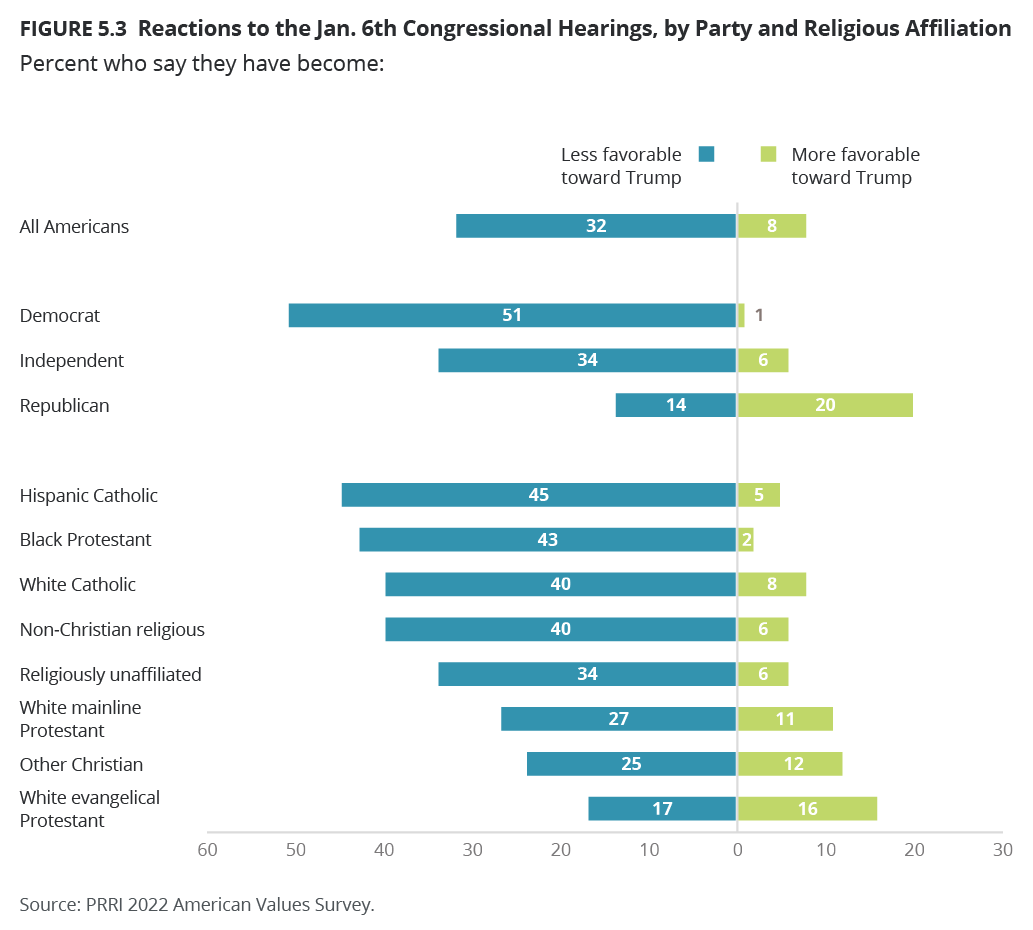
The State of QAnon
To measure the scope of the QAnon movement, PRRI tracks agreement with three statements that form the core tenets of the conspiracy theory:
- The government, media, and financial worlds in the U.S. are controlled by a group of Satan-worshipping pedophiles who run a global child sex-trafficking operation.
- There is a storm coming soon that will sweep away the elites in power and restore the rightful leaders.
- Because things have gotten so far off track, true American patriots may have to resort to violence in order to save our country.
Agreement with these three statements has remained relatively steady from 2021 to 2022. Roughly one in five Americans mostly or completely believe that there is a storm coming to restore rightful leaders (25%), that violence may be necessary to save the country (19%), or that the government, media, and financial worlds are controlled by Satan-worshipping pedophiles (17%).
Americans who mostly agree with these three statements are considered QAnon believers, those who mostly disagree with them are considered QAnon doubters, and those who completely disagree with them are considered QAnon rejecters. Currently, QAnon rejecters make up 30% of Americans, doubters make up 52%, and believers make up 19% of Americans. Remarkably, PRRI data shows that the proportion of respondents qualifying as QAnon believers has increased by 5 percentage points and the number of QAnon rejecters dropping by 10 percentage points.
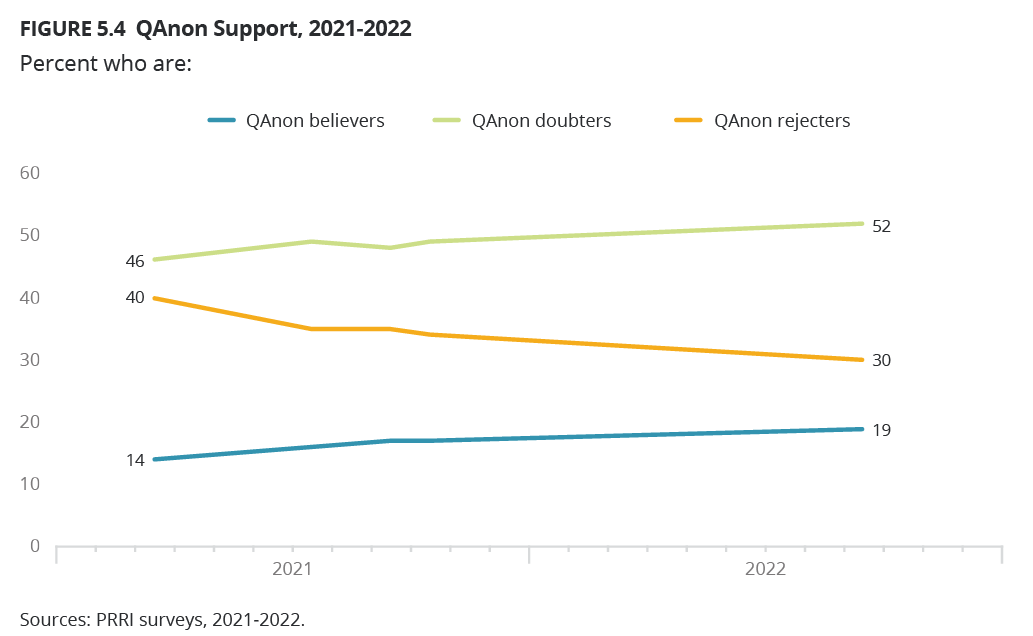
Republicans continue to be most likely to be QAnon believers (27%), compared with 19% of independents and 8% of Democrats. Compared with 2021 responses, partisan tendencies toward QAnon beliefs have remained relatively steady among Republicans (25% in 2021) and Democrats (9% in 2021) but have increased slightly among independents (14% in 2021).
Americans who most trust far-right news outlets (42%) or Fox News (30%), or who do not trust any television news sources (23%) are all more than twice as likely as those who trust mainstream news outlets (11%) to be QAnon believers.
Around one in four other Christians (27%), non-Christian religious Americans (24%), Hispanic Catholics (24%), and white evangelical Protestants (23%) are QAnon believers. Fewer than two in ten white mainline Protestants (17%), Black Protestants (17%), religiously unaffiliated Americans (15%), and white Catholics (11%) are QAnon believers.
QAnon beliefs drop with increased levels of education. Around three in ten Americans with a high school degree or less (29%) are QAnon believers, compared with 19% of those with some college experience, 9% of those with a four-year college degree, and 7% of those with a postgraduate degree.
Appendix: Survey Methodology
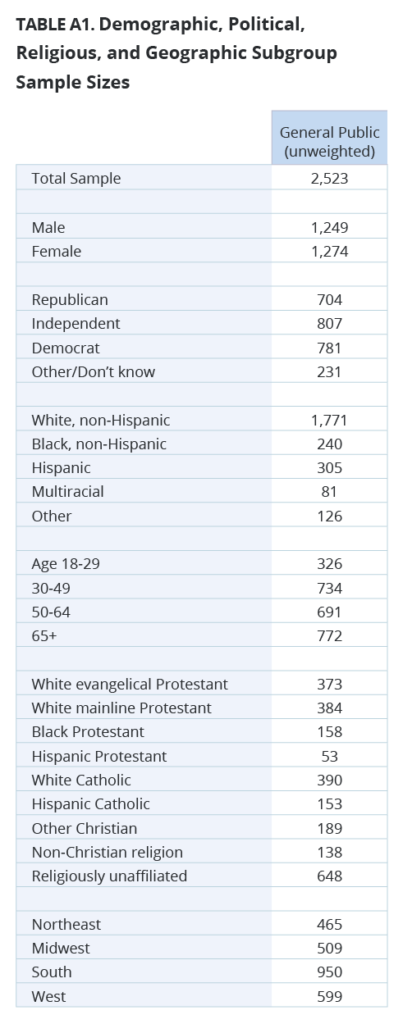 The survey was designed and conducted by PRRI. The survey was made possible through the generous support of the Carnegie Corporation of New York, with additional support from the Ford Foundation, Stand Together Trust, and the Unitarian Universalist Veatch Program at Shelter Rock. The survey was conducted among a representative sample of 2,523 adults (age 18 and up) living in all 50 states in the United States, who are part of Ipsos’s Knowledge Panel. Interviews were conducted online between September 1-11, 2022.
The survey was designed and conducted by PRRI. The survey was made possible through the generous support of the Carnegie Corporation of New York, with additional support from the Ford Foundation, Stand Together Trust, and the Unitarian Universalist Veatch Program at Shelter Rock. The survey was conducted among a representative sample of 2,523 adults (age 18 and up) living in all 50 states in the United States, who are part of Ipsos’s Knowledge Panel. Interviews were conducted online between September 1-11, 2022.
The initial sample drawn from the KnowledgePanel was adjusted using pre-stratification weights so that it approximates the adult U.S. population defined by the latest March supplement of the Current Population Survey. Next, a probability proportional to size (PPS) sampling scheme was used to select a representative sample.
To reduce the effects of any non-response bias, a post-stratification adjustment was applied based on demographic distributions from the most recent American Community Survey (ACS). The post-stratification weight rebalanced the sample based on the following benchmarks: age, race and ethnicity, gender, Census division, metro area, education, and income. The sample weighting was accomplished using an iterative proportional fitting (IFP) process that simultaneously balances the distributions of all variables. Weights were trimmed to prevent individual interviews from having too much influence on the final results. In addition to an overall national weight, separate weights were computed for each state to ensure that the demographic characteristics of the sample closely approximate the demographic characteristics of the target populations. The state-level post-stratification weights rebalanced the sample based on the following benchmarks: age, race and ethnicity, gender, education, and income.
The margin of error for the national survey is +/- 2.3 percentage points at the 95% level of confidence, including the design effect for the survey of 1.35. In addition to sampling error, surveys may also be subject to error or bias due to question wording, context, and order effects. Additional details about the KnowledgePanel can be found on the Ipsos website: https://www.ipsos.com/ en-us/solution/knowledgepanel.
Endnotes
[1]Other Christians includes any Christian not included in the white evangelical, white mainline, Black Protestant, or white and Hispanic Catholic groups. This group is multiracial and includes all Latter-day Saints, Jehovah’s Witnesses, and Orthodox Christians.
[2]Other race Americans includes Asian Americans and Pacific Islanders, Native Americans, and any single race category that is not large enough in the survey to report independently.
[3]Knowing someone who is gay, lesbian, bisexual, or transgender includes self, close friends, family members, and other acquaintances. Most Americans (78%) say they know someone who is gay, lesbian, or bisexual, including 6% who fall into these categories themselves. Only 32% of Americans say they know someone who is transgender, including 1% who are transgender themselves.
[4]This question was asked of only half the sample. Sample sizes of other religious groups are too small to report individually.
Recommended Citation
“Challenges in Moving Toward a More Inclusive Democracy: Findings from the 2022 American Values Survey.” PRRI (October 27, 2022)




